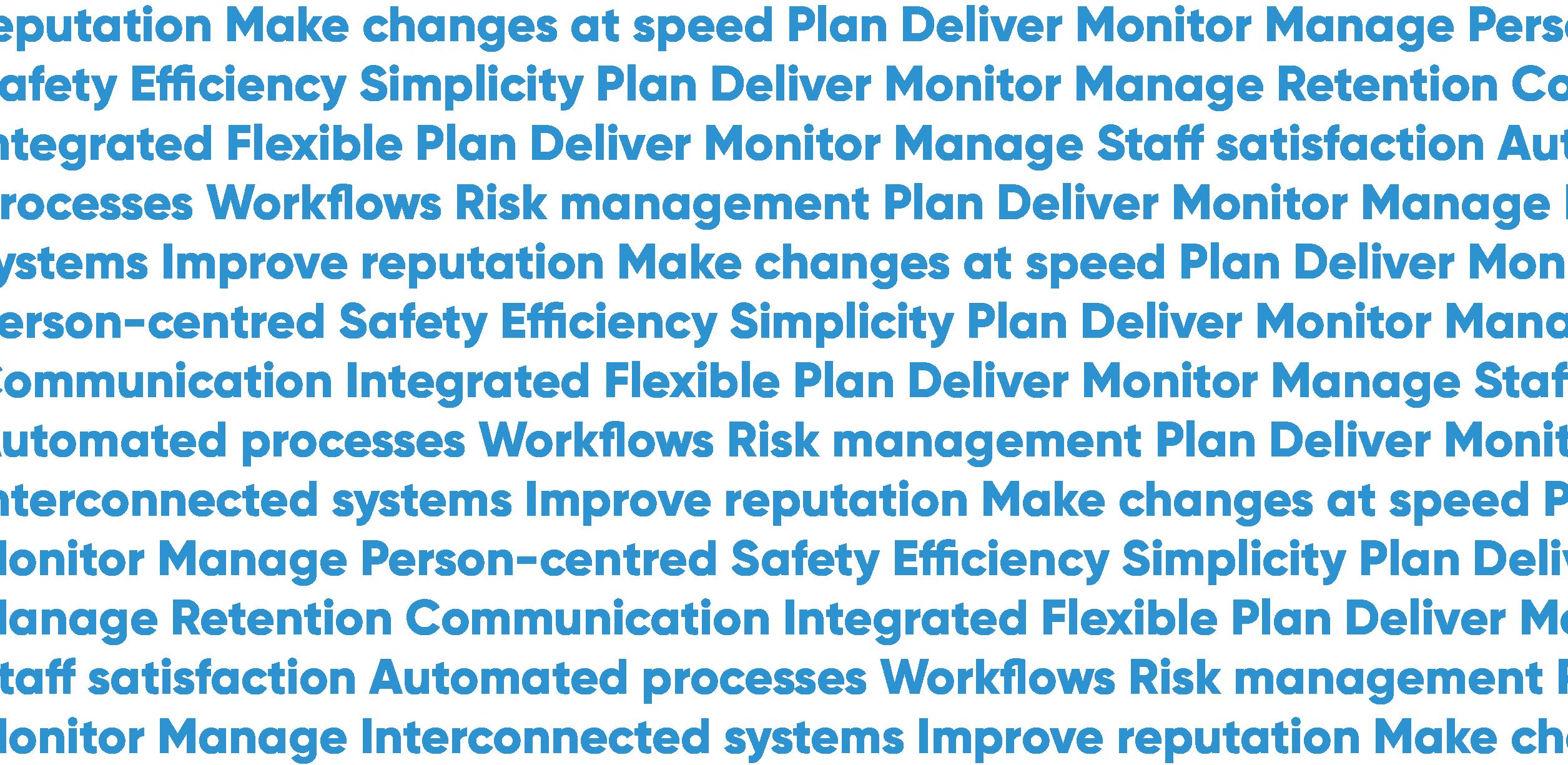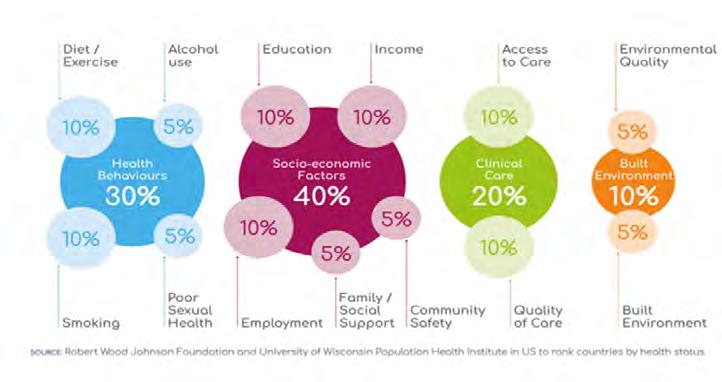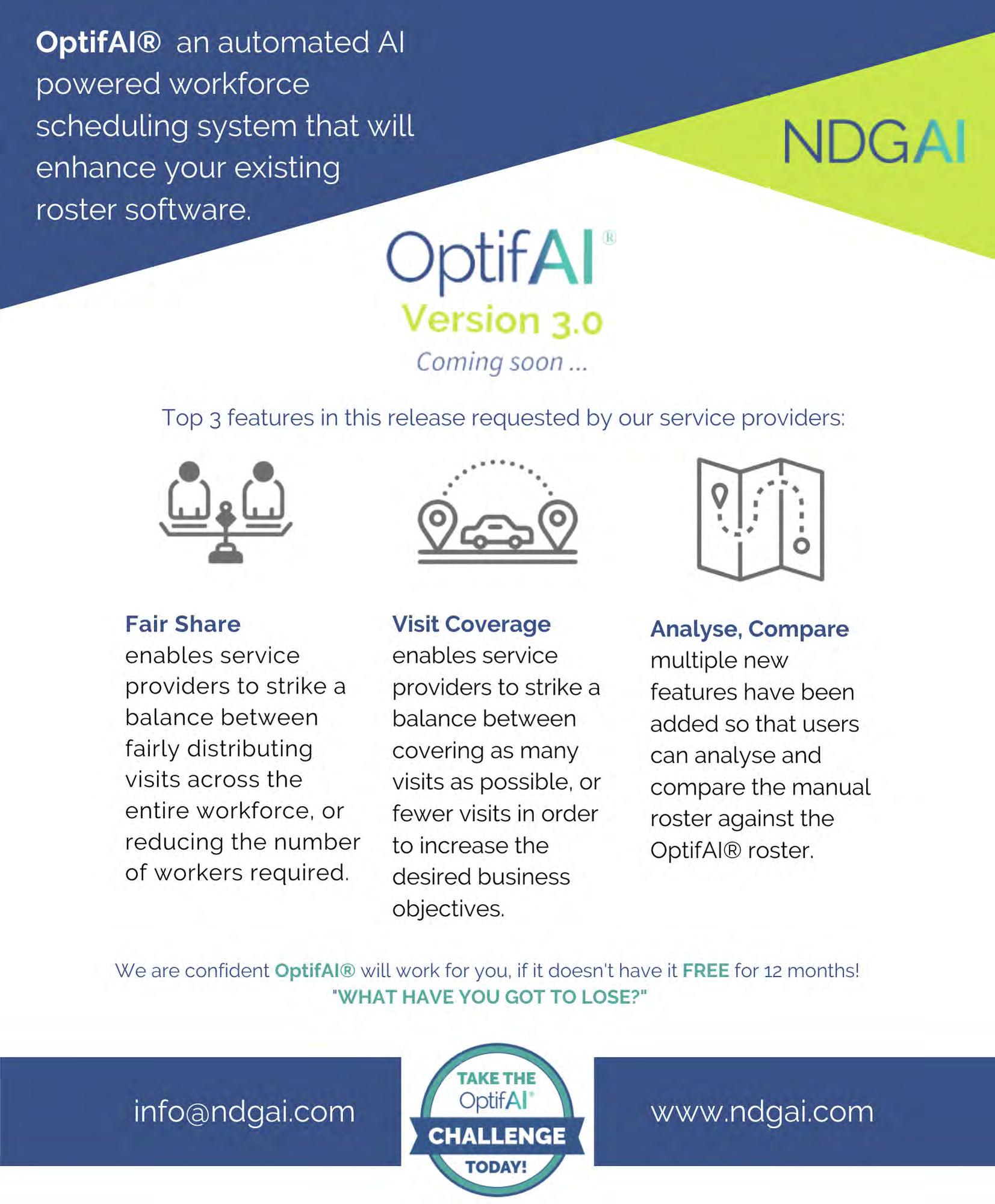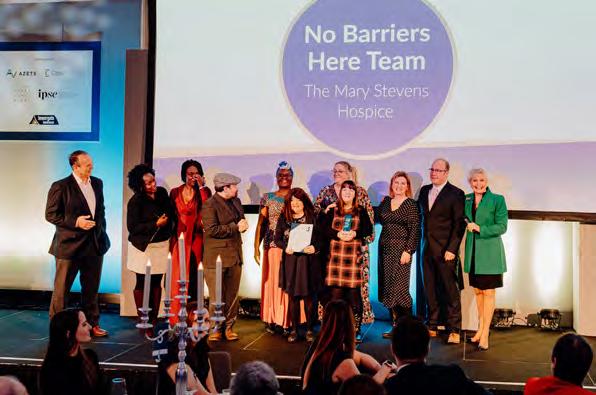INTEGRATED CARE SYSTEMS
The

opportunities for providers
to survive
communities
Finder
the
of care
Professionalise
Rural
Resource
Changing
perception
fairer funding
compliance JUNE 2023 www.caremanagementmatters.co.uk
The case for
Quality







Care Choices Ltd 3, Valley Court Offices, Lower Rd, Croydon, Nr Royston, SG8 0HF (01223) 207770 www.carechoices.co.uk Care Information Search for Care Blog Publications Useful Contacts Contact Us Details Features Care Choices is the reliable place to find the care that’s best for you and the information you need. Whether you’re looking for a care home or ideas on staying independent at home, this website has been designed to make it easy for you. ENHANCE YOUR PROFILE TODAY www.carechoices.co.uk 01223 206967 І paul.ocallaghan@carechoices.co.uk * Minimum booking period is 1 year. Price excludes VAT. For full details of opportunities to promote your service on the website, contact us. Promote your service to care seekers for as little as £4.71 per week*
Simon Bottery reflects on the Government’s promised funding measures over the past 18 months and explains how the support falls short.
Inside CQC
Alison Murray, Deputy Director of Adult Social Care at CQC, shares the latest operational changes at the regulator, examples of good practice and signposts to resources.
CMM News Into Perspective
Our experts comment on the rising labour costs in the care sector and the approach that’s needed to improve sustainability.
Celebrating Excellence
CMM hears from the Development and Innovation Award winners at the Markel 3rd Sector Care Awards 2023.
Event Preview
Find out more about CMM’s third Insight webinar, in association with the National Care Forum (NCF), which will reflect on the first year of Integrated Care Systems (ICSs).
What’s On?
Straight Talk
Co-production weeks starts on 3rd July 2023. Kathryn Smith, Chief Executive of Social Care Institute of Excellence (SCIE), tells us more about the event.
In this issue
A brave new world: Why social care providers must embrace Integrated Care Systems

Cedi Frederick, Chair of NHS Kent and Medway, tells us why Integrated Care Systems (ICSs) present opportunities for providers and why the sector must work differently together.
Standing up for care: Why we need to transform how the care sector is perceived

If the social care sector is to continue to support future generations, which key issues must be addressed? Martin Jones, Chief Executive of Home Instead, calls for greater recognition of the sector.
Life outside the home and opportunities to engage A care home’s role within its community can be that of a support system for local people. Samantha Crawley, Chief Executive of Bracebridge Care Group, shares how care homes can strengthen community partnerships.

Fairer funding for rural communities

Kerry Booth, Chief Executive of The Rural Services Network, outlines the current challenges facing rural communities, including staffing capacity and affordability.
Resource Finder: CQC Compliance
CMM profiles some of the leading organisations specialising in quality compliance to help providers strengthen their approach.

CMM June 2023 3
FEATURES 05 07 09 30 46 48 49 50
REGULARS
Insights
Social Care
40 33 20 25 33 36 40 20 25 36
CONTRIBUTORS
EDITORIAL
editor@caremanagementmatters.co.uk



Editor: Olivia Hubbard

Commissioning Editor: Angharad Burnham




Content Editors: Aislinn Thompson, Henry Thornton
PRODUCTION
Designer: Rebecca Mendil

Director of Creative Operations: Lisa Werthmann

Studio Manager: Jamie Harvey
ADVERTISING
sales@caremanagementmatters.co.uk
01223 207770
Advertising Manager: Aaron Barber aaron.barber@carechoices.co.uk
Director of Sales: David Werthmann david.werthmann@carechoices.co.uk


SUBSCRIPTIONS
Sign up to receive the latest magazines and news for FREE. info@caremanagementmatters.co.uk
01223 207770
www.caremanagementmatters.co.uk
Care Management Matters is published by Care Choices Ltd who cannot be held responsible for views expressed by contributors. Care Management Matters © Care Choices Ltd 2023 CCL REF NO: CMM 20.4
CMM magazine is officially part of the membership entitlement of:
4 CMM June 2023 Are you getting the benefit of the CMM website? Sign up today to start getting more from CMM. It’s FREE for care providers. www.caremanagementmatters.co.uk Kathryn Smith Chief Executive, Social Care Institute for Excellence @SCIE_socialcare
@blimeysimon Simon Bottery Senior Fellow in Social Care, The King’s Fund Fae Mell Managing Director, Kata Care Ruth French Operations Director, Stow Healthcare & NonExecutive Director, The Outstanding Society @StowHealthcare @CQCprof Samantha Crawley Chief Executive, Bracebridge Care Group @samanth52379864 Kerry Booth Chief Executive, The Rural Services Network @rsnonline Martin Jones MBE UK and International Chief Executive of Home Instead @MartinHI_UK @CQCProf Cedi Frederick Chair of NHS Kent and Medway @NHSKentMedway @blimeysimon Gemma Allen Palliative Care Inclusion and Community Partnerships Lead at Mary Stevens Hospice @gemma_allen1 Alison Murray Deputy Director of Adult Social Care, CQC
SOCIAL CARE INSIGHTS

From Simon Bottery
Recent spending plans reveal a government that has retreated from long-term reform of social care and is instead focused simply on keeping the current system afloat. Simon Bottery looks at the numbers.

Roll back to September 2021.
The Government, then led by Boris Johnson, committed to a ‘transformation in adult social care’, promising the introduction of a cap on care costs and ‘wider support for the social care system, particularly our brilliant social care staff’. £5.4bn would be spent over three years – £3.7bn on the cap and other charging reforms and a further £1.7bn on the wider system reform. Three months later, in December 2021, it set out details of how it would spend that £1.7bn, promising pots of money that included £500m for workforce development and £300m to transform housing and support options.
While these were not all the sector had hoped for – the cap was less generous than hoped and the Government notably had no proposals for improving the pay of those ‘brilliant social care
staff’, for example – they were a promising start to what would inevitably have to be a long-term process of reform.
That promise did not last long. Barely a year later, in November 2022, the Government put back introduction of the cap on care costs until October 2025. The length of this delay, with a general election having to take place before then, meant postponement might very likely mean cancellation.
It did not help that this was a case of history repeating itself: plans to introduce a similar cap on care costs had been legislated for in 2014 but postponed in 2015 and then abandoned entirely. And as in 2015, the Government justified the delay by saying it would redirect reform funding into a creaking wider social care system – this time, with up to £7.5bn over the next two years. But even here the news was not
as promising as it seemed: of the £7.5bn, £1.6bn was to be shared by local authorities and the NHS, £3.15bn was to be split between adult and children’s social care and £1.7bn was dependent on local authorities raising council tax to the maximum. There was also a clear focus from the Government across all the spending on tackling hospital discharge delays.
There was, however, still that £1.7bn for wider system reform. Or was there? Details were taking an awful long time to emerge from the Department of Health and Social Care. Finally, in April this year, in its ‘next steps’ for reform, the Government published its plans to spend the £1.7bn.
Except they did not add up to £1.7bn or anything like it. The money for workforce reform had been cut from £500m to £250m and the £300m housing transformation had become
a £102m fund for housing adaptations. In total, the promised funding came to £590m – roughly a third of what had originally been promised in 2021 and not even the £700m that the Government PR machine tried to proclaim on the day of the launch.
So, what of the rest of the money? Over a few days, it transpired that the gap between the £590m and the £1.7bn was made up of:
• A spending cut of £100m (part of the original £1.7bn was to be funded by savings that did not happen, so the money has been lost).
• £300m that DHSC says it has already spent, even though it has given no breakdown of where this money went.
• £710m which DHSC is saying it will spend over the next two years, although it has not yet any plans for how. The smart money is that much of it will go towards the current urgent priority, tackling delayed discharges from hospital.
This, then, is a Government retreating from bold, ambitious plans for system reform and instead moving pots of cash around until it identifies the next hole in the system that it needs to plug.
Instead of a strategic approach to reform, it is short term and short sighted. And that approach is easy to identify because it is, sadly, what social care has become used to over many years.
CMM June 2023 5
Simon Bottery is a Senior Fellow in Social Care at The King’s Fund. Email: S.Bottery@kingsfund.org.uk Twitter: @blimeysimon
From Struggling to Thriving: The Game Changing Benefits of Contract Restructuring for Care Providers

It is a well-publicized fact that the care sector in the UK is facing challenges in sustaining quality care services due to rising costs, inadequate funding, and regulatory requirements.

To alleviate these pressures, care providers are maximizing their VAT recovery opportunities through Contract Restructuring, which allows them to reclaim input tax on a range of goods and services, such as staff training, building maintenance, energy costs, and even medical equipment, on an ongoing basis. In addition to these fairly significant VAT benefits, the commercial advantages are considerable, including streamlining in the management & administration of fees, and notable savings brought about by economies of scale.


As the care sector begins to accept Contract Restructuring as a means of managing costs effectively, coupled with an increasing number of suppliers offering this service, many of whom will not necessarily be specialists in this area, choosing the right firm can be overwhelming. Contract Restructuring, if implemented correctly, is an intricate structure which requires in depth knowledge of VAT and the laws associated therewith; and the assurance of working alongside a team that has the expertise and experience in dealing with local authorities, commissioning groups and inevitably, HMRC.
For more details on choosing the right specialist to manage your VAT Recovery click here to find out more.
As indirect tax specialists who have worked almost exclusively in the care sector since 2004, VAT Solutions are ideally placed to offer care providers a key to financial sustainability and future growth by helping them to realise the potential offered to reclaim VAT on an ongoing basis through our Contract Restructuring service, plus its accompanying business efficiencies.

Contact a member of our business development team for more information on how to optimize your VAT recovery and ensure financial sustainability and future growth in this challenging environment.

Sheffield, UK 0114 280 3630 www.vatsol.com Heidi@vatsol.com
New Interim Chief Inspector of Adult Social Care and Integrated Care

We’re delighted to welcome James Bullion as our Interim Chief Inspector of Adult Social Care and Integrated Care, following Kate Terroni’s appointment as our Interim Deputy Chief Executive. James brings huge experience to CQC, having most recently been the Executive Director of Adult Social Services (DASS) at Norfolk County Council and a member of the Norfolk and Waveney Integrated Care Board. Over the last six years at Norfolk, James has overseen a transformation of adult services with a strong focus on community development, strengthening social work and integrated services with NHS partners.
James was President of the Association of Directors of Adult Social Services (ADASS) in 2020-21, helping to support and advocate for people during the pandemic. We’re thrilled that James is joining us – especially at the time we’re starting to assess local authorities. Over the past year, James has been working closely with us as ADASS's representative to support the development of our new assessments of local authorities. We look forward to working together.
Improving lives
We’re always looking to showcase examples
Inside CQC
ALISON MURRAY
of good practice when we see them. We’re especially keen to share stories of innovation and improvement. Recently in Norwich we inspected Belvoir House, a residential home for older people and younger adults, some of whom live with dementia. We were pleased to see that the service had improved from inadequate and being in special measures to good overall.
Hazel Roberts, Deputy Director for Operations in the East and London, said, ‘We found a significant change for the good. We saw a person-centred culture for people using the service where staff engaged, listened and knew people well. People received individual one-to-one support, which included activities outside of the home. We found staff were attentive to people, gently supporting them whilst encouraging independence.’
An important part of every inspection is having conversations with people who use the service, their relatives and the staff working there. During this inspection, people and relatives told us the care and support at Belvoir House had improved significantly. People are supported by kind, attentive staff, who encourage their independence. People's privacy and dignity is respected and promoted. New systems are in place to ensure people and their relatives are able to express their views on the support they receive.
This kind of person-centred care is key to helping people living with dementia to feel
supported to have as much choice and control over their own lives as possible. As we reach the end of the Alzheimer's Society's Dementia Action Week, it can be useful to reflect on the effects that dementia can have on people and their families and the impact that good, person-centred care can deliver. This is something which remains high on our list of priorities.
Change in action
Our operational colleagues have now moved into their new integrated inspection and assessment teams. Over the coming months, these new teams will begin to reach out to providers and other local stakeholders. These teams bring together our specialist sector teams (adult social care, hospitals and primary medical services) to help break down barriers that previously separated the sectors. This mix of expertise and experience means we can share specialist skills and knowledge about all sectors. For the time being, though, there are no changes for providers. You will still be assessed by CQC colleagues who are experts in your service type, using the same methodology. The new teams will ultimately enable better conversations with you about how things are working between you and other services in your local area. Don’t forget that there are lots of resources on our YouTube channel and website to help explain our ongoing transformation.
CMM June 2023 7
@CQCProf
Alison Murray is the Deputy Director of Adult Social Care at CQC. Email:
providerengagement@cqc.org.uk Twitter:
This month, we hear from Alison Murray, Deputy Director of Adult Social Care at CQC, who shares the latest operational changes at the regulator, examples of good practice and the latest resources relating to the CQC’s changing framework.
Care for a new career?
Love what you do, every day
Care Dorset is a new Local Authority Trading Company, wholly owned by Dorset Council. The company began delivering services to Dorset Council residents in October 2022. We have two exciting opportunities for values based, people focused and dynamic leaders to join our existing teams.
Candidates will focus on the balance between regulatory compliance, excellent quality, and innovation and be CQC literate. Both roles will sit within the Operational Delivery Team and be supported by a range of colleagues who are experts in their fields, including but not exclusively HR, Quality and Safeguarding and Finance.
Our ideal candidates will be able to demonstrate our values:
We are people focused We have integrity We will develop We are genuine We are a team
Reablement Registered Manager
This is a permanent role.
Salary: £44,559 to £50,470, for the right candidate we will offer £8k relocation package.
A vital part of our business is our Reablement offer. Care Dorset have ambitious plans for both transformation and growth of this area of our business. Looking to ensure the residents of Dorset get the best support to live their lives as independently as possible. The Reablement Team will be supporting people from a varied age and diverse background with a wide range of needs to access support packages which promote their independence. This will include supported discharge from hospital and admission avoidance. This role is system facing and the ideal candidate will have experience of working in an MDT arena.
Interested?
Visit https://www.caredorset.co.uk/RRM
Operational Delivery Lead
This is a fixed term contract until May 2025.
Salary: £67,000 + car allowance.
This role oversees the transformation and quality improvement work of our current Community Living offer. Currently this is our Supported Living service, and we are looking for the right person to take the service through the process of re-registration with CQC and to embed a new management structure. Working collaboratively with colleagues delivering support and the quality team, the aim, is to achieve exceptional person centred, active support to people with a range of abilities, allowing them to live independent and ordinary lives.
Care Dorset have ambitious and exciting plans to develop and expand our Community Living offer. This will include growing our current supported living team, and also, to stretch into Extra Care and other areas of community based independent living.

Interested?
Visit https://www.caredorset.co.uk/ODL
–
Community Living
your next career at www.caredorset.co.uk Alternatively, call 01656 336094 or email Natasha Best on natasha@bluegreenrecruit.co.uk
Find
ADASS publishes reforming care report
The Association of Directors of Adult Social Services (ADASS) has published a roadmap for reforming adult social care in England. According to the report, there is a consensus on what sort of care and support system is needed, but for decades there has been no political or collective will to make it happen.
The roadmap proposes how care and support could be transformed in England, focusing on 10 key areas for change: from improving housing
options for people who are older or disabled, to tackling the chronic social care staffing issues including pay and conditions, to supporting carers and making care more affordable.
It charts what needs to be done in the next two years, what changes are needed in two to five years and what is needed longer term over the next 10 years to ensure that everyone who needs care and support can access it, whomever they are and wherever they live in England. The report
also includes examples already underway that are improving care and support for people.
The report was commissioned by Sarah McClinton, departing ADASS President, and has been developed by social care experts Kate Jopling and Dr Anna Dixon. They studied research and thinking about social care reform from the past 10 years and synthesised it into a practical action plan for change.
The findings were presented to adult social care leaders at the
Report reviews pandemic response
A new report published by The Nuffield Trust suggests that ‘structural weaknesses’ harmed the social care sector at the pandemic's outset, leaving it unable to protect people.
The independent health think tank's latest report finds that a lack of visibility of the sector, unclear accountability, insecure funding and poor workforce pay and conditions impacted on
the sector’s ability to implement protective measures in a timely way.
The report, published as part of joint research with the London School of Economics, looks at issues which emerged with the COVID-19 response in the social care sector in England. It finds that the fragmented nature of the system and a shortage of civil servants working on social care contributed to
confusion over who was responsible for decisions and implementation in the COVID-19 response, which, for example, undermined the effective distribution of PPE and testing for care staff.
Following the first four months of the COVID-19 response, the report states that progress was made to plan for ongoing outbreaks in the short to medium term, for instance with the establishment of
ADASS Spring Seminar
in April, Sarah McClinton said, ‘The Government must back local leaders and local people to take charge of fixing care in their communities because they know what’s needed. What’s impressive in this report is that despite the odds we’ve faced – the pandemic, the costof-living crisis, chronic underfunding – local people are showing what’s possible. But they need the backing of the whole country to make it happen everywhere.’
Care Quality Commission
James Bullion has been appointed as the new Interim Chief Inspector of Adult Social Care and Integrated Care at Care Quality Commission (CQC). James is currently Executive Director of Adult Social Services (DASS) at Norfolk County Council and a member of the Norfolk and Waveney Integrated Care Board.
Greenock Care Group
Kincaid House in Greenock, part of Meallmore Group, has announced the appointment of its new care home Manager, Anne Gardner. Anne previously held the position of Deputy Manager at Kincaid and has almost 15 years of experience in the care sector. In her new role, she will oversee the management of the home, including ensuring that staff provide the highest quality of care for residents.
McCarthy Stone
the social care taskforce in June 2020 and the decision to continue to provide PPE purchased centrally. The smoother subsequent rollout of vaccinations in social care settings pointed to improved collaboration between the Government and social care partners, and the prioritisation of carers in the vaccination rollout was widely regarded as a positive step forward.
McCarthy Stone, a leading developer and manager of retirement communities, has welcomed back two senior directors. Brendon O’Neill has returned to the business as Divisional Managing Director (DMD) for McCarthy Stone’s Southern region. Kim Caldwell will also return as its new Group Sales and Marketing Director.
The Disabilities Trust
Leading brain injury charity, The Disabilities Trust, has appointed Shirley Rowe as its new Executive Director of Service Delivery, joining the charity at a time of growth. She will drive continuous improvement, growth and accountable leadership across a portfolio of functions, including operations, clinical services, quality assurance, governance, safeguarding and business development.
CMM June 2023 9 NEWS
APPOINTMENTS kindly sponsored by @CMM_Magazine #CMMOFFTHEPAGE LISTEN • LEARN • LEAD EPISODE FOUR CARING FOR PEOPLE AT THE END OF LIFE To subscribe and listen to previous episodes, visit: www.caremanagementmatters.co.uk/podcast Available at the start of June
Call to align NHS and care worker pay
Dimensions, the not-for-profit organisation supporting people with learning disabilities and autism, is calling for Government to align minimum care worker pay to NHS Band 3.
New research reveals 80% of the public think social care is as important or deserves the same respect as the NHS. Furthermore, only 6% of the nation does not think social care workers should receive the same pay as NHS Band 3 workers – falling to just 3% of those over age 55.
NHS Band 3 includes clinical support workers, therapy assistants, pharmacy assistants, administrative workers and clerical staff, who are currently paid £11.11 per hour. Dimensions – and the public – believe social care workers’ skills and professionalism should be recognised at an equal level with these important roles to reflect the complex caring tasks they undertake, alongside supporting people to gain choice, control and agency over their lives.
At present, four in 10 social care workers earn less than the real living wage, Skills for Care reports. Between 2013-2020, a sales assistant went from earning 13p per hour less than a care worker to 21p more on average, Skills for Care found, but social care providers are restricted in increasing pay by tough limits on local authority budgets. Amidst the ongoing cost-of-living crisis, many skilled social care workers feel they have no choice but to leave the workforce for better paid roles elsewhere.
Rachael Dodgson, Chief Executive of Dimensions, said, ‘The shortfall in funding for the social care workforce is a betrayal of the hardworking, skilled individuals who were on the front line of the pandemic and continue to provide essential care and support for older and disabled people who draw on social care support. The NHS simply cannot function without social care – so social care deserves the same recognition that the NHS rightfully has.’
CQC appoints interim Chief Executive
James Bullion has been appointed new Interim Chief Inspector of Adult Social Care and Integrated Care at Care Quality Commission (CQC).
In March, the CQC announced that Kate Terroni would be taking on the interim position of Deputy Chief Executive and stepping away from her role as Chief Inspector of Adult Social Care. James is currently Executive Director of Adult Social Services (DASS) at Norfolk County Council and a member of the Norfolk and Waveney Integrated Care Board.
In 2020-21, James was President of the Association of Directors of Adult Social Services (ADASS), helping to support and advocate for people during the pandemic. James has recently been working for the Department of Health and Social Care on plans to ensure people can leave hospital when they are fit to do so. James has also been working closely with CQC over the past
Countdown begins for Carers Week 2023
Leading carers' charities joined the Minister for Social Care, Helen Whately MP, for a roundtable discussion to launch the countdown to Carers Week 2023.
The group explored ways to increase recognition and support for unpaid carers ahead of Carers Week, which is taking place from 5th-11th June 2023. This year’s theme is, ‘Recognising and Supporting Carers in the Community.’
The event highlighted key opportunities to identify unpaid carers and connect them with the appropriate support, as well as ways to support family members to identify their caring role. The wide-ranging discussion also looked at the Department for Health and Social Care’s White paper,
People at the Heart of Care, and how a cross-departmental working group focusing on supporting unpaid carers could help carers with the various challenges they face.
The group heard from Margaret, a carer based in Lambeth, who looks after her 91-year-old mother after she had a stroke, and her 33-yearold daughter who has learning disabilities and complex needs. Margaret provides round the clock care for her family, and emphasised the need for carers to be able to rely on services so that they can get vital breaks and recharge. She also noted how important it was that GPs and medical professionals understand unpaid carers’ needs.
Organised by Carers UK,
the event also included senior representatives from Age UK, Carers Trust, the Motor Neurone Disease Association, Oxfam GB, Rethink Mental Illness, and The Lewy Body Society
Helen Walker, Chief Executive of Carers UK, said, ‘I thank the Minister for attending our roundtable event and launching our Carers Week countdown, as well as to Margaret for sharing her caring experience. We’ve had an important discussion and are all too aware that many carers can miss out on crucial support when they do not identify their caring role.
‘Carers Week is a valuable opportunity for all of us to reach out to the unpaid carers we know and connect them with support.'
year as ADASS’s representative to support the development of the regulator's new assessments of local authorities.
Commenting on James's appointment, Kate Terroni, Interim Deputy Chief Executive at CQC, said, ‘It's fantastic to have James join the team at the point we go live with our new powers to assess local authorities, as an experienced DASS and having been involved with the development of our approach.’
James Bullion said, ‘I am delighted to be joining CQC at such an important time for the organisation, councils and people drawing on services as we strengthen the national assurance arrangements and reform social care. I am grateful to Norfolk for supporting this and hope to bring my experience and understanding of being a DASS, as well as my national work as ADASS past president and on social care discharge, to the many talents in CQC.’
Helen Whately MP, Minister for Social Care, said, 'I’m proud to team up with the charities behind this year’s Carers Week to help spread the message far and wide.
'Unpaid carers like Margaret go above and beyond every day for the people they care for. I want to make sure we truly understand what carers most want, and the best people to tell us are carers themselves.
'We’ve made real progress on carers’ recognition, and CQC assurance of local councils’ care act duties is an important step forwards. But there’s more to do –together with Carers UK and other charities – to make sure carers get the recognition and support they deserve.'
10 CMM June 2023 NEWS


CMM June 2023 11 software that helps care homes thrive Learn how Sage can help: • Increase revenues by 25% without adding additional headcount. • Save over 400 person-hours annually. • Streamline your operations and automate your financials. Download product brochure
Care and nursing associations merge

The National Care Association (NCA) and Registered Nursing Home Association (RNHA) has announced that the organisations will be merging.
The merged organisation will be called the National Care Association, with over 1,100 individual members, and will be the largest trade association in the country. Ian Turner, Executive Chairman of RNHA and Nadra Ahmed CBE, Executive Chairman of NCA, will continue in their roles and co-chair the new representative body. They intend to manage the merger without interruption to current services and activities.
The new organisation will use its united voice to continue to support providers within its membership and the wider social care sector at this challenging time. With providers facing increasingly uncertain times, especially with recruitment and
retention and the funding of their services, both boards felt a merger would ensure the National Care Association represents its collective membership powerfully and strategically and would bring greater benefits and services for its membership.
Nadra Ahmed CBE, Co-Chairman, said, ‘We believe, in the interest of our memberships, a strong and united force should emerge for all providers from this bold decision by our boards. We face considerable challenges, a further delay in any promise of reform and funding challenges making it critical that the interests of small- and medium-sized providers are fully represented at both local and national levels. We are often dismissed as a fragmented sector with no single voice – this merger will challenge Government on any such assumptions.’
Care Workers’ Charity launches appeal
The Care Workers’ Charity (CWC) has launched a new ‘£100,000 Before The End of May’ appeal to organisations in the social care sector.
The appeal, organised to support care workers in need, comes in the wake of the Government's well-publicised U-turn on funding towards workforce development and reform which takes away support for wellbeing.
The CWC runs programmes open to care workers, providing hardship funds, mental health support and training. The average support grant given to care workers in financial need is £500.
Commenting on the CWC appeal prior to the launch, Karolina Gerlich, Chief Executive of The Care Workers’ Charity, said, ‘The social care workforce has, once again,
been sold down the river. The stark reality is that the sector needs to fend for itself and we need to look after our own. Because the Government has pulled back on its pledge for additional funding, we need to step up our fundraising as we work to support people in need so that we can help to provide for their wellbeing.'
Martin Jones added, ‘The CWC’s work is focused on providing a safety net for care workers who are facing financial hardship for whatever reason. We also provide invaluable mental health support and training. We are asking for companies to make a £500 donation. Whilst costs are going up for everyone, this is equal to less than £42 per month and I would hope that most would feel this is a reasonable request.'
Audit and inspection
CQC mock inspection with a clear, concise action plan support
Quality assurance
12 CMM June 2023 NEWS
frameworks Turnaround projects/Crisis Management Transformational Change H.R guidance and support Interim management at all levels Regulation advice including registration, challenges, variations Business development/commissioning new services Leadership development and coaching Training and coaching in a variety of Health and Social care courses Provide Expert Witness Reports for duty of care breaches and medical litigation Bidding for contracts and writing tenders Carry out complex clinical investigations Hands-on support and leadership for frontline staff Information Governance Project management Due Diligence The support we can provide are: Led by a Registered Nurse and highly experienced Quality Director, LSW Care Solutions supports Health and Social Care providers across all specialisms. Whether you are looking at registering a new service or need targeted, sustainable support, we can help. Interested In A Free Consultation? Contact us to arrange a free consultation and learn how we can support you and your business. 07956 647497 www.lswcaresolutions.co.uk laura.wood@lswcaresolutionsltd.co.uk
Investigation into supported housing
Gaps in data and regulation are, in some areas, allowing increasing numbers of landlords to profit by providing costly, sub-standard housing with little or no support, supervision or care, according to a new National Audit Office (NAO) report.
Current gaps in regulation mean some supported housing providers are receiving less scrutiny and there is no direct regulation of the quality of support offered. One local authority reported to the Committee for Levelling Up, Housing and Communities that, in the 345 supported housing units it inspected between April 2019 and January 2022, it found 323 hazards classed as a serious and immediate risk to a person's health and safety.
The Department for Levelling Up, Housing and Communities (DLUHC) is aware of the limits of available data and has commissioned research to provide


an up-to-date understanding of the supported housing sector. In 2022, DLUHC also allocated £20m over three years to 26 local authorities to help them improve the quality and value for money of supported housing, together with enhancing local authorities' knowledge of local supply and demand.
A new private members' Bill aimed at improving supported housing is due to come into force by this summer with Government backing. The Bill, introduced by Bob Blackman MP, will develop national standards, require local authorities to review supported housing in their areas and enable them to create licensing schemes for exempt accommodation. DLUHC has yet to establish how it will support local authorities to implement these new duties, although it has committed to a full consultation.
New research on CQC inspections and fines

The average CQC fine increased by 242% post-pandemic, new analysis from full-service law firm Shakespeare Martineau has revealed. When comparing pre-pandemic (2017-2019) with pandemic and post-pandemic (2020-2022), prosecutions by the CQC increased by 50% – from 30 to 45. The research also found that the average fine amplified by 242% to more than £550,000. In comparison, the average fine prepandemic was just over £160,000.
Jordan Glackin, Healthcare Partner at Shakespeare Martineau, said, ‘After conversations with clients over the past couple of years, these findings are not surprising. The CQC had virtually stopped all inspections – except in emergencies – during the pandemic and so, as a result of the backlog, an increase in prosecutions once normality started to resume was to be expected.
‘With more catching up likely

to be done and the sector being placed firmly under a microscope during the pandemic, particularly in the eyes of the public, we expect this activity to increase further – especially as some cases have taken more than three years to be brought forward.
‘However, there are cautionary measures care homes and registered providers can put in place to mitigate the risk of persecution, limit the impact of prosecution and, in some cases, prevent it from proceeding to court.’
The largest fine handed down pre-pandemic was £225,170 in 2019. During and post-pandemic, this was £2.5m, which was delivered in 2021 – an increase of more than 1,000%.
According to Shakespeare Martineau, Regulation 12 (safe care and treatment) was the most breached over the past six years, accounting for 63% of all prosecutions.
g www.uniqueiq.co.uk 0800 888 6868 Bringing home care software together Helping you to plan, deliver, monitor and manage care Enquire today! NEWS CMM June 2023 13
What are the benefits of choosing Person Centred Software’s Digital Care Planning System?



How does digital care planning help your residents?
Receive person centred care: Care staff can quickly access residents medication information and preferences, allowing them to delivery timely, person-centred care.
Happier residents: Staff are able to spend more quality time with residents due to the decrease in admin tasks
positive
between
and social care services: Through the use of eRedBag (Electronic hospital pack) care providers can
information
and external
exceptional
for residents. Book a demo with us today 01483 357 657 hello@personcentredsoftware.com www.personcentredsoftware.com Scan to find out more
A
journey
health
communicate
with hospitals
specialists to ensure an
experience
Experts update on VIVALDI study at Care Week
Care England, The Outstanding Society (OS) and University College London (UCL) presented the VIVALDI Social Care Showcase at UK Care Week in April.
The organisations established a new partnership at the end of 2022 to tackle the problem of infections in care homes and learn lessons from the pandemic, building on the national VIVALDI study. The presentation’s expert panel included Deborah Sturdy CBE, Chief Nurse for Adult Social Care at the Department of Health and Social Care, and Professor Ruth Endacott, Director of Nursing and Midwifery at the National Institute for Health and Care Research, alongside relatives and providers that have contributed to the
research programme.
The OS reports that over 800 care homes have already committed to VIVALDI’s mission to improve the quality of life for people living, visiting and working in care homes, while also reducing the risks of infections and avoiding hospital admissions.
Between June 2020 and April 2022, UCL tested around 6,000 staff and residents across approximately 220 care homes in England and estimated the proportion who have been infected with COVID-19 in the past and have antibodies.
The study was subsequently extended and a further two or three rounds of antibody testing were planned in 60 care homes between April 2022 and March 2023.
Occupational therapists in demand
Almost nine in 10 (86%) occupational therapists reported an increase in demand between November 2021 and November 2022, says a new report.
The report, from the Royal College of Occupational Therapists (RCOT), also highlights that four in five (79%) occupational therapists believe this increase in demand is because of a lack of capacity elsewhere in the health and care system. The same proportion attributes it to people’s needs becoming more complex because of delays to care and treatment.
According to the report, which looked at responses from over 2,600 occupational therapists throughout the UK about the state of the workforce, other reasons for increased demand in occupational therapy services include:
• People accessing services struggling more with activities because of delayed intervention (66%).
• People accessing services
IN FOCUS
New research on unpaid carers
WHAT’S THE STORY?
New findings from Carers UK and the University of Sheffield show that unpaid carers in England and Wales contribute £445m to the economy in England and Wales every day –that’s £162 billion per year.
The value of unpaid care is equivalent to a second NHS in England and Wales, which in 2020/21 received an estimated £164bn in funding, according to The King's Fund.
This new analysis was undertaken by researchers at the Centre for Care and published by Carers UK. The authors have also acknowledged the support of the Economic and Social Research Council.
WHAT DID THE EXPERTS SAY?
Helen Walker, Chief Executive of Carers UK, said, ‘It is deeply concerning that the increase in the value of unpaid care over the last decade is a result of fewer carers providing more hours of care. The ever-declining availability of social care means there is shrinking support for families to pull on – and they are left without a choice but to put other areas of their life on hold and provide more care.
having increased mental health needs (54%).
• Lack of availability of carers (52%).
• A broader range of referrals being received (42%).
In addition, almost four in five (78%) of those surveyed said their team wasn’t big enough to meet demand, and more than half (55%) said that long-standing recruitment issues meant the services they were providing weren’t meeting people’s needs.
RCOT Director of Practice and Innovation, Karin Orman, said, ‘Our report shows how closely the different parts of the health and care system need to work together, and how dependent they are on each other. It’s positive to see the value of occupational therapy is being recognised, but it’s deeply shocking to hear occupational therapists say they fear the services they’re providing are unsafe.’
The analysis used 2021 Census numbers of people providing unpaid care by gender and hours of care in England and Wales. This was calculated against the nominal unit cost for replacement care, taken as £25 per hour in 2021 and £18 per hour in 2011, in line with the official estimate of the actual cost per hour of providing home care to an adult.
WHAT WERE THE FINDINGS?
The economic value of unpaid care in England and Wales in 2021 – now estimated to be £162bn – is almost a third (29%) higher than the value of unpaid care in 2011.
The analysis reveals that unpaid carers are, as individuals, providing more hours of care than they were 10 years ago. While the latest 2021 Census data shows there are fewer carers in England and Wales than in 2011, the number of hours of care they provide has increased – leading to their higher economic contribution.
‘Having to care round the clock for a loved one has significant implications for people’s ability to stay in paid work, remain financially resilient and maintain their health. Lacking adequate support, unpaid carers feel they are being taken for granted.
‘The Government must show that it values and supports unpaid carers by investing in and delivering quality care services for families in the longer term. Carers need a funded National Carers Strategy and recognition within the NHS. For hundreds of thousands of carers on low incomes, they are desperate to see their financial support urgently reviewed.’
Leading the research, Professor Matt Bennett, Deputy Director of the Centre for Care at the University of Sheffield, said, ‘The economic contribution made by unpaid carers has increased by 29% in the last decade and paints a stark picture of the savings they make to health care budgets. Without unpaid carers, our health and social care systems would collapse.
‘In fact, our work shows that people are providing more hours of unpaid care than ever before. We hope policy makers see the urgent need to act to support unpaid carers.’
CMM June 2023 15 NEWS
NEWS / IN FOCUS
My Home Life publishes COVID-19 report
My Home Life England shares new insights from care homes about their experiences of the pandemic.
Rebuilding Together is a report based upon conversations with over 200 people from 34 care homes across England. It offers insight into what support care homes received during the pandemic that they felt was valuable, in order to inform future responses to crises. It also explores what support care homes need right now, knowing that the pandemic is still evident in many care homes, both in terms of COVID-19 infection and the long-term trauma that it has left behind.
Teamwork, loyalty, resilience, commitment and connection to one another were critical for people living and working in care homes throughout the COVID-19 pandemic. When support was absent, particularly at the
beginning of the pandemic, this led to people feeling alone and sometimes very scared. Care home managers expressed a desire to be recognised, supported and appreciated (on a par with NHS colleagues) and for guidance and policy to be clear, consistent and timely. They also identified a desire to sustain some of the positive changes experienced during the pandemic, for example greater knowledge of IT systems, infection control procedures and different forms of communication with families and community links.
The report concludes that there is a vital need for care providers, the wider health and social care system and local communities to invest in the wellbeing of care teams, to actively engage in open conversations with people living and working in care homes, and to explore what would help them now and into the future.
Nourish Care integrates workforce app

Nourish Care has announced its partnership with first workforce management solution, Workforce.com.
The expansion of Nourish partnerships into people solutions is a significant step towards advancing the oversight into operations and workforce management within the Nourish digital eco-system. This means that Nourish and Workforce customers will now be able to connect the two platforms for improved operational efficiencies. This free integration aims to alleviate pressures and reduce administrative tasks by removing the need for double entry of information whilst maintaining data integrity.
One of the biggest challenges care providers face today is staff recruitment and retention and planning resources is a major priority for care teams. Workforce management systems such as Workforce will optimise
the scheduling, tracking and management of employees to reduce labour costs and increase employee satisfaction. Workforce management systems play a key role in helping businesses achieve their goals.
Steve Lawrence, Head of Product at Nourish, said, ‘We are thrilled to be partnering with Workforce. Our collaboration means we automate day-to-day tasks and share valuable information between the platforms, giving time back to care teams and improving their experience. We look forward to developing the capabilities of the integration further for improved workforce management.’
Nourish was one of the first digital social care record suppliers to be recognised as an NHS Transformation Directorate Assured Supplier at the launch and is accredited by PRSB as a Quality Partner.
16 CMM June 2023 NEWS
“Very simply, I could describe PASS GP Connect in just one word: Amazing! It saves so much time and undoubtedly helps us to provide better care.”
Digital care management for today and tomorrow Access GP records instantly Administer medication safely Improve and tailor care Assign and track outcomes Scan me Discover GP Connect at: everylifetechnologies.com
Andrea Baxter Owner and Registered Manager, Baxters Homecare
Care provider drives up sustainability efforts
A Cambridgeshire care provider is continuing to clean up its carbon act by installing electric car charging ports on its premises — a new initiative that forms part of its continued efforts to reduce its carbon footprint and promote green energy.
Askham Village Community, located in the village of Doddington, has already made significant strides towards
becoming more sustainable, having been harnessing energy from its very own solar farm located in a field adjacent to its care and rehab centres.
The installation of the new charging ports will now allow visitors and staff to charge their electric vehicles while at Askham and is a positive step towards promoting the use of eco-friendly transport and
reducing carbon emissions. Since its installation in 2021, Askham’s 150kW Solar Photovoltaic System has enabled it to offset a large proportion of its daytime electrical consumption — with the care community projected to save as much as 800,000kg/CO2 over the next 20 years.
Askham has also embarked on a transition to LED lighting, whilst
Caremark sponsors Canine Partners’ puppy
Caremark, a leading home care provider, is proud to announce its sponsorship of Fudge – a Labrador X Golden Retriever puppy – through Canine Partners, a registered charity that trains assistance dogs for people with physical disabilities.
As an ongoing sponsor of Canine Partners, Caremark is thrilled to support Fudge – a name voted for by Caremark’s network of franchise owners – on
his journey to becoming a life-changing assistance dog.
The sponsorship is a first-of-its-kind initiative in the home care sector, where the values of the charity and the sponsor align perfectly, helping people to remain at home with independence and a greater quality of life.
David Glover, Joint Chief Executive of Caremark, expressed his excitement about sponsoring
Fudge and said, ‘We are delighted to be part of such a wonderful initiative. At Caremark, we strive to improve the lives of thousands of individuals through our home care services. As part of our commitment to supporting those in need, we are proud to sponsor Fudge the puppy and provide ongoing financial support to Canine Partners. By doing so, we are empowering individuals to lead more fulfilling, confident and happy lives.’
also reviewing all of its suppliers to ensure green credentials are given due consideration.
Askham’s solar field was built in partnership with Optimeyes Energy alongside the Engenera Renewable Group, who have created a carbon-saving system that is made up of rows of groundmounted solar modules, each with the capacity to provide up to 330w of electrical generation.
Fudge is currently undergoing 18 months of puppy training and advanced training in Bedfordshire until he is partnered with a person with physical disabilities. Life-transforming dogs like Fudge provide practical, physiological, psychological and social benefits, including increased independence and confidence, improved motivation and self-esteem, companionship and a sense of security.
Customer service solutions for care homes

Whilst your teams focus on care, we can look after all inbound calls and enquiries.
Highly-experienced in the healthcare sector, we’re empathetic, efficient and enthusiastic - operating days a week to ensure family and relatives get the help and answers they need promptly and accurately.
CMM June 2023 17 NEWS
NEWS FROM ACROSS THE GLOBE
Australian care workers to receive pay rise
According to the news agency Reuters, Australia's Labour Government has promised to set aside 7.5bn Australian dollars (£4bn) in next week's federal budget to fund a 15% pay rise for retirement home staff as the sector suffers from a shortage of skilled workers.
The increase in wages, over the next four years from 1st July, will bump up the salaries of 250,000 workers, with registered nurses expected to get an additional $10,000 a year.
About a quarter of a million elderly and disabled Australians
live in care homes. That number is expected to rise significantly as the country's ‘Baby Boomers’, estimated at more than five million people born between 1946 and 1964, grow older and need additional care.
Aged Care Minister Anika Wells said during a press
Abu Dhabi workers to obtain official licences
The Department of Community Development (DCD) has called on all social care professionals to obtain a licence to practice the profession. This comes as part of DCD’s role in regulating the social sector in the Emirates of Abu Dhabi in accordance with the emirate’s laws.
This is part of the department's efforts to regulate the social care sector. The department works to apply the penalties against violators of the licensing regulations, based on the Administrative Violations and Fines Schedule for Social Care Professionals in Abu Dhabi.
Mr Saeed Mubarak bin Amro, Manager of Social Control
Division at DCD, said, ‘Since its inception of licensing social care professionals and adoption of licensing standards, the department has organised several awareness workshops for social care service providers, to highlight the role played by the department in regulating and licensing workers in the field of social care.
‘It has also developed professional diplomas in co-operation with the UAE University to qualify and raise the efficiency of professionals in the social sector as part of the support plan. In addition to that, the department has organised competency tests available at
multiple testing centres, both locally and globally. It has also automated licensing procedures to be submitted through the ‘Tamm’ platform, the official electronic platform for Abu Dhabi Government services.’
He also added that the department's keenness to implement administrative fines will help organise the provided social care services, and ensuring that they are of the highest quality, and are provided by professionals who are licensed in accordance with the approved standards. Furthermore, it will ensure social care sector development based on professional ethics, high efficiency
AI monitoring system launches in Japan
SenterCare (Tel Aviv, Israel) and Nozomi MedAlliance
K.K. (Minato-ku, Tokyo) have announced a strategic partnership agreement to bring SenterCare's advanced home-based ageing technology to Japan.
Japan is the world's most ageing society, with nearly 3% of the population aged 65 and over, and women accounting for the majority. By 2036, seniors aged 65 and over will account for one third of the population.
This super-ageing society is a major issue for the Japan healthcare system, and there is a need for
technology that enables the elderly to live at home as before. A declining workforce also means fewer people caring for the elderly.
SenterCare has developed an adaptable AI-powered behaviour monitoring system, which uses state-of-the-art sensor technology and AI software analysis for personalised and accurate monitoring. This system is a non-intrusive system that does not use any cameras, wearables, microphones, etc. Product developers say that it is able to distinguish between different individuals in the same home, using
that accurate and rich data, making analytics, and providing valuable actionable insights.
Shungo Adachi, President and Chief Executive of Nozomi MedAlliance, said, ‘We believe that SenterCare's technology can be a comprehensive, next-generation solution for seniors to live at home with peace of mind. Our partnership with Nozomi allows SenterCare to enter a market that desperately needs technological solutions for a safe, ageing society in Japan. We believe we can provide the answers to provide the best care to the elderly in a safe and secure way.’
conference, ‘Today, we turn a corner for aged care in Australia ... long deserved, long awaited for. That is lifechanging money for people. That is enormous and that properly and fairly addresses the costs of delivering quality aged care in this country.’
and best professional practices. Social care professions that are licensed by the department include five main categories: social worker, psychotherapist, applied behaviour analyst, psychologist, and counsellor –each with their various specialties specified according to the approved standards.
The DCD began working on the project to license social care professionals at the end of 2020, to ensure proper co-ordination of those in social care professions and to monitor their commitment to providing the highest quality services, in accordance with legislations and in collaboration with the relevant authorities.
SenterCare is a privately held company based in Israel that is dedicated to enable people to age safely at home using its sensing and AI technologies. SenterCare was established by Trendlines Innovation Labs, in collaboration with Natali, a leading home medical and assistance services provider. Nozomi specialises in introducing global medical device and digital health innovations into the Japan market. Nozomi is committed to driving improved patient outcomes and health economics.
18 CMM June 2023 NEWS NEWS
NEWS
START YOUR DIGITAL TRANSFORMATION JOURNEY WITH RADAR HEALTHCARE

Radar Healthcare helps organisations in health and social care across the UK and internationally to make a real difference when it comes to managing risk, quality and compliance processes. In one tailored system manage everything from incidents and action plans to audits and risk. The analytics module uses AI and machine learning to bring all this data together and work towards improving the quality of care.
Yesterday’s innovation is tomorrow’s norm so as a company we have to keep up with the trends but what makes us different is how agile we are, enabling us to be the first to market for new initiatives."
Mike Taylor, Chief Technology Officer

CLICK HERE TO DISCOVER MORE...
HERE TO BOOK A DEMO...
CLICK
A BRAVE NEW WORLD:

20 CMM June 2023
Our beloved NHS will mark its 75th anniversary on 5th July 2023. Rightly, this will be cause for celebration. The fundamental principle that the NHS remains free at the point of use has been maintained since 1948 and, whilst the NHS has been challenged over the last few years like never before, the 1.4 million people who work in the service remain as committed to its mission and values today as any day since it was formed. We know that current public satisfaction with the NHS is not where we would like it to be and, across the NHS, colleagues are working hard to improve the speed, quality and safety of the services it offers.
For the NHS to survive for another 75 years, it must change to reflect the world as it is today and will be, rather than the world as it was when Aneurin Bevan led its establishment. The country that the NHS is here to serve is changing, people’s expectations are changing and the NHS must meet these.
A changing landscape

Whilst life expectancy has stalled since 2011, and for certain groups it has gone into reverse, research by The Centre for Ageing Better shows there are now 11 million people aged over 65; a 52% increase since 1981 and that number will increase to 13 million by 2033, which will be 22% of the population. Whilst this should be a cause for celebration, our changing demography will put more strain on the NHS and, of course, social care. The same research also reports that 2.1 million men and 2.2 million women aged between 45 and 74 live alone and there has been a 68% increase in the figure for men since the year 2000. Currently, 22% of men and 33% of women provide unpaid care to a loved one. All of this data suggests that we will need more social care than we have now.
It’s not just our ageing population that is putting the NHS under pressure. More and more of us are living with long-term, life-limiting conditions that are putting even more strain on the NHS. For example, obesity and the health conditions that arise from it cost the NHS around £6bn annually – this is forecast to increase to £9.7bn a year by 2050. The Building Research Establishment (BRE) Group’s 2021 report The Cost of Poor Housing found that poor-quality housing costs the NHS over £1.4bn a year. Unless we do things differently in the future, the 11.9% of the UK’s GDP that we currently spend on healthcare will grow to levels that the country will be unable to afford.
It is against this backdrop that the 2022 Health and Care Act was introduced, resulting in the establishment of 42 ICSs across England, covering populations of between 500,000 and three million people. The King’s Fund has provided a simple description of an ICS as ‘…partnerships that bring together NHS organisations, local authorities and others to take collective responsibility for planning services, improving health and reducing inequalities across geographical areas’ – but that I’m afraid is where simplicity ends. It has been said (more than once) that when you’ve seen one ICS, you’ve seen all ICSs. However, ICSs are complex ‘ecosystems’ made up of Integrated Care Boards (ICBs), which have taken on the old Clinical Commissioning Group’s responsibilities to plan, commission and fund NHS services, as well as being a catalyst for change across NHS services, along with Integrated Care Partnerships (ICPs),
CMM June 2023 21
It’s been some time since Integrated Care Systems (ICSs) were first talked about, but what is the overall aim of ICSs and what are the opportunities for social care providers? Cedi Frederick, Chair of NHS Kent and Medway, tells us more.
>
WHY SOCIAL CARE PROVIDERS MUST EMBRACE INTEGRATED CARE SYSTEMS
which bring the NHS, local authorities together with system partners, including the voluntary, community and social enterprise sector, and others together to develop a health and care strategy for the area.
Joined-up approach
Integrated care systems have four key aims. To:
• Improve outcomes in population health and health care.
• Tackle inequalities in outcomes, experience and access.
• Enhance productivity and value for money.
• Help the NHS to support broader social and economic development.
Whilst these aims are universal across all 42 ICSs, how each one delivers them will be different based on their local circumstances, but what is clear, enshrined in the 2022 Act and is non-negotiable is that collaboration will be the foundation on which ICSs will be built, with a focus on place and local populations rather than the previous world of competition and organisational autonomy. There is clear evidence (see infographic below) that the clinical work of the NHS only accounts for around c20% of a person’s health and wellbeing, with the remaining 80% depending on other factors such as the quality of housing you live in, how much you earn, how much exercise you take, how much you smoke, etc. All are factors outside of the NHS’s control.
For the Star Trek fans reading this article, when I first became Chair of NHS Kent and Medway, I used to describe ICSs as being similar to the three-dimensional chess games played by Mr Spock and Captain Kirk on the bridge of the Starship Enterprise. Now, after being officially in existence for nine months, I think ICSs are more like trying to complete a Rubik’s Cube!
For obvious financial, organisational and political reasons we cannot establish truly ‘integrated’ care systems, because what we know is that we have an ‘interdepedent’ care system whereby the principle of mutuality is at its core. But this brave new world of collaboration will not happen overnight. It will not happen because any one and/or group of people say it must be so. It will take time. Every organisation within an ICS will need to change. It will take leaders from all sectors to listen with authenticity and act with humility to work very differently in the future.
As a former social provider chief executive,
I became more and more frustrated that the NHS felt impenetrable and impossible to deal with on any level and the NHS was disconnected from local authorities, leaving many service users and residents whose care and support my organisation was responsible for in difficult and sometimes distressing situations. Our collective challenge as ICSs develop and mature is to work together very differently. Our local communities deserve no less.
Better together
With social care funding continuing to be challenging, with around 160,000 social care staff vacancies, a 29% annual staff turnover rate, 500,000 mainly older people waiting for an assessment, review, care package or direct payment, combined with the average of 13,400 people a day being in hospital, despite no longer meeting the criteria to stay (as of December 2022), which is a 30% increase since December 2021, the picture does indeed look bleak. However, I believe that together, whilst we may not be able to replace the reduction in the People at the Heart of Care funding announced recently, it remains in ICBs’ interests and that of the wider ICS for the NHS to work with social care providers on the workforce development agenda and on local recruitment and retention initiatives. Despite also being under huge financial pressure in 2023/24, ICBs have the financial flexibility to work with social care providers on ‘Invest to Save’ initiatives, projects and programmes, but social care providers –be they in the residential care homes or
domiciliary care sector – need to be engaged with ICBs either directly or through their local care associations. If investing £5 directly in social care, for example, training social care staff in new and different areas of work, and potentially reducing social care staff turnover saves an ICB £6, then that’s £5 of ICB money well spent.
The recently published Hewitt Review highlights the real and significant opportunities for ICS partners to work together to ‘reimagine’ social care and create a sector that is secure over the long term. The NHS needs to work with social care to provide more rehab beds, more stepdown and intermediate care beds and more reablement support for people who need to be discharged back into their own homes. ICBs cannot afford to allow their local social care sector to wither on the vine with providers handing back contracts, closing care homes and exiting the market.
One of the biggest challenges facing ICBs is how do we move the money around? How do we review and reconfigure our investment profile to give us more available money to spend in new and different ways in primary and community healthcare, as well as in social care?
We are all standing on a burning social care platform. If we can’t see the flames, then surely we can smell the smoke and feel it getting warm under our feet.
I’m becoming well known for repeating the mantras, ‘We can’t fix the NHS until we fix social care’ and ‘The answer’s leadership. Now, what’s the question?’ CMM
This graphic shows the wider determinants of health and wellbeing, with only 20% being directly related to the NHS.
What do you think are the biggest challenges relating to ICBs? Visit www.caremanagementmatters.co.uk and share your feedback on the article.

22 CMM June 2023
Cedi Frederick is the Chair of NHS Kent and Medway. Email: c.frederick@nhs.net Twitter: @NHSKentMedway
A BRAVE NEW WORLD: WHY SOCIAL CARE PROVIDERS MUST EMBRACE INTEGRATED CARE SYSTEMS >

When it comes to laundry.
need reliable service and a provider that listens.
to
your equipment.
need WASHCO. Nominate your laundry hero at washco.co.uk/lovelaundryawards Chat with us about your home’s needs today. 08000 546 546 washco.co.uk
We care too. You
You need
trust
You



Episode three sponsored by LISTEN • LEARN • LEAD EPISODE THREE AVAILABLE ONLINE NOW Industry-respected co-hosts Provider-led content Real life case studies Take-home business advice Best practice in the social care sector @CMM_Magazine #CMMOFFTHEPAGE Available to listen to on Spotify and Apple Podcasts, and to watch on the CMM website. Visit www.caremanagementmatters.co.uk for more information and subscribe for FREE! To get involved in the podcast, contact: editor@caremanagementmatters.co.uk For information on sponsoring the podcast, contact: aaron.barber@carechoices.co.uk
STANDING UP FOR CARE
Why we need to transform how the care sector is perceived
The social care sector needs more recognition, writes Martin Jones, Chief Executive of Home Instead. What key changes must happen if social care is to survive and keep supporting future generations?

CMM June 2023 25




26 CMM June 2023 TIME FOR CHANGE! Care Home Insurance due for renewal? For FREE, no obligation quotations call 01273 977221 or visit: www.care-insurance.co.uk Phoenix Specialist Risk Solutions, Office One, 1 Coldbath Square, Farringdon, London, EC1R 5HL PHOENIX SPECIALIST RISK SOLUTIONS
Nothing summed up the sense of crisis around the provision of care in the UK more evocatively than the fate of the measure that was meant to solve it. Having waited a generation for a plan to address the many issues the adult care sector faces, we finally got a package of measures, announced in 2021, and – whatever you may have thought of that package – it was due to come into force later this year.
The centrepiece, as far as the general public was concerned, was a redesigned funding model with an £86,000 individual cost cap. Yet last November, amid rampant inflation and with the economy teetering on the brink of full-blown recession, it was announced that this febrile financial climate meant the package’s introduction was being delayed for a further two years. There’s always a new crisis to supersede the existing ones, it seems.
But if the relief measures have gone away for now, the care sector’s problems – particularly around demand, funding and recruitment –very much haven't. In fact, they are getting worse all the time.
Nearly one in five people in the UK are now over 65 and, for the first time, there are more people of pensionable age in Britain than children.1 Naturally, as our population gets steadily older, the demand for care increases. Over the past year, the number of enquiries fielded by Home Instead, for example, rose by 27%. And, I understand, this is typical.
A joined-up problem
In a different climate, this level of demand would be great news for growth, but – with proportionally fewer younger people to plug the job gaps and a decline in the availability of overseas labour since Brexit –instead, the sector finds itself in a perfect storm.
One recent study found that staff shortages had risen by 52% over the previous year to hit a record 165,000 vacancies, with almost one in 10 social care posts in England unfilled. And,
unsurprisingly, staff shortages are very clearly affecting care quality; three quarters of care homes who had seen their Care Quality Commission (CQC) rating worsen blamed this factor.2
Meanwhile, the NHS is having a well-documented crisis of its own. This is happening in too many areas to explore in detail here, from cancer treatment waiting times to GP appointment shortages. But perhaps the starkest expression came in early March when Office for National Statistics (ONS) figures showed higher-than-usual death levels, with tens of thousands more people dying than normal levels, even after the pandemic’s ravages had subsided.3
In short-termist, emergency-led Whitehall, the normal mindset thinks of these two crises, in care and the NHS, as two different, competing problems which just happen to be taking place in parallel. But any independent, holistic examination reveals that they are in fact two conjoined parts of a wider problem. Because the NHS, too, is buckling under ever-increasing demand and struggling to fill the jobs to cope.
The most obvious pinch point where the two sectors collide is on the issue of so-called ‘bed blockers’. I’m not keen on the phrase itself as it has a tendency to characterise the people it describes as a nuisance rather than real people with real feelings and challenges, not to mention framing them as the problem rather than part of wider systemic failings. Nevertheless, the syndrome it describes, if crudely, is a real one.
Recent figures show that there are currently over 13,000 NHS beds – around a third of total capacity in the service – taken up by patients otherwise fit to leave hospital, up from 10,000 just a year previously.4 And a record six in 10 patients who were adjudged well enough to leave aren’t being discharged because there’s nowhere to send them.5
It’s plainly obvious that you can’t solve the myriad problems of the NHS without addressing the problems in care. Lately there have
been some nods in this direction – a £500m emergency ‘discharge fund’ in November – but nothing substantive enough to affect real change. And even the delayed longer-term ‘solution’ may not amount to meaningful change as it puts an increased emphasis on homecare without addressing the issue of provision.
So how do we improve things? I’d suggest the key to beginning to transform the care sector is to change the way it’s perceived.
Care is a hugely underacknowledged partner in the healthcare ecosystem that has little of the kudos attached to the NHS. No one was banging pots and pans for care workers three years ago but they had as tough a time during the pandemic as anyone. Change can start by giving the whole sector more recognition.
I mentioned earlier the issue of foreign labour shortages in this context and although this is undoubtedly a factor in unfilled jobs it’s also arguably a bigger factor in the widespread misconception that care workers are unskilled and therefore should be cheap. It’s time to completely revolutionise this perception of care work.
We need to change ideas and assumptions around it, the language used to discuss it, practically everything about the way it’s presented. But this change will have to start from within – we need to drive it ourselves and make the wider world take note.
Making the shift
The first and most crucial change we can affect is in professionalising the role of the care worker.
We can do this by redefining the way care is framed. Instead of being a generic, low-skilled, across-the-board position, it can be seen as what it is: a series of related specialisms with different knowledge and skill sets required for working with different clients with varying circumstances and conditions. A specialist dementia >
CMM June 2023 27 STANDING UP FOR CARE: WHY WE NEED TO TRANSFORM HOW THE CARE SECTOR IS PERCEIVED

care worker should not be seen as interchangeable with someone who works with Parkinson’s patients, for example. They are distinct roles with particular demands.
The key to changing this perception is to make training a central part of a career path in care, upskilling our workforce with clinical and social training to help designate more health tasks outside the NHS, which could, in turn, meaningfully contribute to relieve pressure points in the service.
A properly trained workforce would be more respected and valued in the wider employment landscape, which in turn would make a career in care more appealing in the first place. This particularly pertains in the homecare sub-sector where there is arguably an even greater negative perception – probably because of an erroneous assumption that a domestic environment makes for an easier workplace; in fact, it merely poses different and frequently greater challenges.
The second key change is to make care and those working in it more tech enabled. We need to keep moving towards smarter systems, that are digitally based, to make the whole sector more agile, more responsive and more efficient.
Once again, training and investment are the key to making this happen – and this again goes to making the wider status enhanced and roles demonstrably more skilled.
In giving this sector the allure of an attractive career path, rather than the perception of a dead-end job, we
References
should begin to turn the tide on the staff shortage issue.
This shift in perception should start to tempt younger people into the profession in greater numbers – but we certainly should not confine ourselves to that demographic. One lesson I’ve learned time and again since I joined Home Instead is of the hugely underappreciated and untapped talent that older workers can bring. By making a career in care more appealing, and underpinning it with training, we can make it an obvious choice for a second career for older people who feel they have acquired the kind of life skills that can make a valuable contribution.
Older people aren’t a homogenous entity. We employ a number of carers well into their eighties who are frequently older than the people they care for. At the moment this is unusual, but there’s no reason it should be; it can be the most rewarding work possible and many older people can thrive doing it. The silver economy, as it’s known, is a hugely underutilised resource that could help to transform the wider economy.
I’d also hope that the particular model we use – care in the home as opposed to the care home – will become more widely adopted in future, because it gives clients greater comfort and dignity at a more affordable cost. We await with interest any clearer guidance on how the Government hopes to pivot more towards homecare in the future and handle the specific practical challenges around that.
But this really is about much more than any one company or approach.
A system for the future
I said before that we will need to drive these changes ourselves. We’ve seen many times before that care is often the last thing on the agenda for politicians at both national and local levels. Yes, we do need to keep lobbying them for help on many fronts. But many of the issues bedevilling both the care sector and the NHS are systemic and successive governments lack the long-term strategic focus to address them. Instead they resort to short-term funding boosts in the hope that this will provide a fix. Not only is this an expensive strategy but it simply doesn’t work.
This is why I’ve become an advocate for a completely new set-up – an independent body to run the UK’s wider health system. This would be comparable to the setting of interest rates being taken out of the hands of ministers a generation ago.
It would stop the NHS and the related care sector being what they are now – an electoral football, kicked about as part of the cut and thrust of party politics – and enable a more focused and longer-term approach that’s beyond the whims of electoral cycles. A revitalised care sector with employees who have higher status and, yes, I would hope are better paid as this change in mindset beds in.
You can’t ‘save the NHS’ without making care part of the solution. CMM
1 https://www.theguardian.com/uk-news/2022/jun/28/england-and-wales-population-rises-to-record-59m
2 https://www.theguardian.com/commentisfree/2022/aug/22/the-guardian-view-on-the-social-care-recruitment-crisis-paystaff-what-they-are-worth
3 https://www.theguardian.com/society/2023/mar/09/nhs-crisis-causing-continued-higher-than-normal-levels-of-deathinengland-and-wales
4 https://www.england.nhs.uk/statistics/statistical-work-areas/discharge-delays-acute-data/
5 https://www.telegraph.co.uk/news/2022/10/10/record-numbers-healthy-patients-stuck-hospital-amid-care-shortage/
What action do you think needs to happen to ensure we have a system for the future? Visit www.caremanagementmatters.co.uk and share your feedback.
CMM June 2023 29 STANDING UP FOR CARE: WHY WE NEED TO TRANSFORM HOW THE CARE SECTOR IS PERCEIVED
Martin Jones MBE is UK & International Chief Executive of Home Instead. Twitter: @MartinHI_UK
>
Into Perspective
HOW CAN THE SECTOR ADDRESS ITS CONCERNS ABOUT INCREASING LABOUR COSTS?
Insurance, holiday and sick pay to increase
in turn.
Publicly funded care
Government’s Autumn Statement announced funding of up to £2.8bn in 2023/24 in England and £4.7bn in 2024/25 for social care and discharge. Part of this package has been allocated to local authorities ‘to make tangible improvements to adult social care’, such as addressing low fee rates and workforce pressures.
Despite this, analysis from the Economics Observatory suggests that rising inflation rates experienced by local authorities and providers since Government’s Autumn statement threatens the extent to which the funding will bolster the sector financially.

Given rising costs, the analysis argues that fewer care packages will be allocated using the funding than first thought, and that there will be less money than anticipated for providers to address increasing labour costs.
Agency staff
The latest figures from Skills for Care state that there are approximately 165,000 vacant posts in the sector in 2021/22. This is an increase of 55,000 or 52% since 2020/21. Faced with increased workforce shortages, providers are turning to agencies to provide temporary staff to fill the gaps.
Wage watch
Since April 2023, the National Living Wage (NLW) has risen to £10.42, an increase of 92p or 9.7%.
From a homecare perspective, the Homecare Association calculates that the cost of recruiting and retaining staff represents
the largest financial aspect of delivering homecare services, approximately 70% of total expenditure.
In addition, the Homecare Association reports that wage increases cause the cost of other financial obligations including statutory pensions, National
Unfortunately, this resource often comes at a price, with a recent Care England survey finding that 86% of respondents reported that the costs of nurse and carer agency staff were challenging for their organisation, and 84% reported having to pay ‘higher’ or ‘significantly higher’ rates compared to full-time staff.
Fair Cost of Care
In September 2021, Government shared its intention to provide funding to local authorities to enable them to pay providers fees that cover the actual cost of delivering the service on their behalf. This, the Fair Cost of Care Fund, sets out to move away from the practice of local authorities paying providers low fees as a result of budget constraints, and the differential in fee rates charged to some self-funders in order to cover the shortcomings of local authority fees.
On paper, the fund should result in providers being able to allocate more money to address increased labour costs. However, the Nuffield Trust has highlighted three main concerns that may stand in the way of the fund’s establishment –complex provider and council collaboration, doubts about the funding’s sufficiency and uncertainty concerning council capacity to administer the funding.
Cash alternatives
A research report examining the implementation of the Real Living Wage in adult social care surveyed sector employees who reported that non-financial factors also contributed to job satisfaction and wellbeing. Good shift patterns, advance notice of work rota, training opportunities, professional development and career progression were all well received by respondents to the report’s survey. With labour costs undoubtedly increasing, placing pressure on providers’ finances, can providers explore innovative ways to retain their workforce and make people feel valued?
30 CMM June 2023
According to the Office for National Statistics (ONS), human health and social work activities have seen an 11.5% increase in total employment costs since 2019. This is 1.7% greater than the 9.8% increase experienced by the ‘whole economy’ average.
Providers are facing myriad financial challenges to keep their businesses afloat, increasing labour costs being one of the most urgent.
It isn’t just about money
Ruth French, Operations Director, Stow Healthcare and Non-Executive Director, The Outstanding Society @StowHealthcare
We are at a crossroads in social care. We all know staff deserve to be paid more and to be recognised for the highly skilled and compassionate work they do, but there is a point about basic economics many services struggle with.
With a 17% rise in the National Living Wage over the last two years, and operators managing significant price hikes in energy, consumables and food, there is no doubt many care recipients have seen fee increases that have done more than raise eyebrows.
Local authorities have, to a degree, recognised the pressures on the industry, but few providers will argue that revised fees will cover anything like real costs. Indeed, 92% of care providers are now citing staff costs as the main pressure they are facing1
The 2023 Sector Pulse Check report cites one third of providers having considered exiting the market in the past 12 months, so how do we stem the tide? I think we have three opportunities:
• We must reflect the real cost of care in the fees we charge. For those yet to increase fees in 2023, give clear explanations of why charges must increase. This applies to local authority fees too – if you pay the Real Living Wage, ask what mitigations

your local authority offers for providers like you going above and beyond.
• It isn’t just about money. What do you do, or what can you do, to show your staff how you value them? A nurse told me recently she hadn’t expected a pay rise in the current climate; she was delighted enough with the ‘small extras’ – a thank you voucher, an Easter egg and just feeling part of a great team. Paying our staff the Real Living Wage has helped, but an extra day off for birthdays has been a real winner.
• Show why you are worth it. With the Government continuing to kick sustainable future care funding way into the long grass, we must continue to shout about the value that social care brings to our care commissioners and future care recipients.
Far too few people with a microphone are using it to champion social care. Grab your microphone – in your meetings with commissioners, through positive social media stories, with your staff. Let’s show why fair social care funding matters.
1. Sector Pulse Check, Hft and Care England Analysis by CEBR, March 2023
We need to take a holistic approach
Fae Mell, Managing Director, Kata Care @faemell


The care sector is facing a significant challenge with increasing labour costs and it is vital to address this to ensure the sustainability of the sector. The pandemic has exacerbated the problem, resulting in staff shortages and high staff turnover rates.
As a care consultancy, Kata Care has extensive experience in staffing and consultancy services, which can help address the concerns of increasing labour costs. Our experience has shown that implementing effective strategies with the help of sector experts can significantly reduce labour costs and improve the quality of care provided.
One key strategy is to invest in internal recruitment training to help care providers identify and retain suitable staff. By training recruitment staff, they can improve their ability to select and onboard the right candidates, reducing the cost of staff turnover and ensuring a stable workforce.
Another effective approach is ongoing quality monitoring. By regularly monitoring the quality of care provided, it is possible to identify areas for improvement and provide the necessary training and support to enhance the skills of care staff. This can help to improve the quality of care, increase job satisfaction and reduce staff
turnover. Moreover, mock CQC inspections help care providers identify areas for improvement and implement changes to ensure they meet CQC requirements. This can help reduce the risk of costly compliance issues, improve staff performance and enhance quality of care, which can also lead to increased fees or funding.
Additionally, technology plays a significant role in reducing labour costs. Care providers can invest in software to streamline care delivery and reduce administrative burdens on care workers. This helps reduce the number of staff required, ultimately reducing labour costs. Consultancies can support with the implementation, as well as navigating the Adult Social Care Digital Transformation Fund.
We need to take a holistic approach to address the increasing labour costs. Care consultancy can play a crucial role in helping care providers to identify and implement effective workforce planning strategies, training, ongoing quality monitoring, mock CQC inspections and technology adoption. By addressing this issue head on, the care sector can ensure it continues to provide high-quality care to the most vulnerable members of society, while also improving the job satisfaction and retention rates of its workforce.
31
• Governance documents • Audit Tools • Dependency Tool • Clinical Policies & Procedures • FREE Downloads • Risk Assessment Templates • PRN Protocols E-Document Shop Now OPEN!
Guard






32 CMM June 2023
my.supplychain.nhs.uk/catalogue www.alphalabs.co.uk
Search for ‘drug denature’ and purchase at: Safe, Compliant Controlled Drug Disposal starts with
of
to
you the peace of mind to
on what you do best. Care Management Matters_V1.0_April 2023.indd 1 08/03/2023 16:11:58
against the misuse
controlled drugs
protect your staff, residents and communities by using drug denaturing kits. Giving
focus
Life outside the home and the opportunities to engage
Samantha Crawley, Chief Executive of Bracebridge Care Group, shares how social care providers can support older people to have a sense of purpose and belonging in their local community.
There’s an old saying that it takes a village to raise a child, yet there doesn’t appear to be the same sentiment in the English language around how we support and maximise the learning from older members of our communities.
In Japan, the elderly are generally treated with the utmost respect. Many Japanese families have several generations living under one roof. This factor is believed to be one of the many reasons that, in Japan, elderly people live longer than any other population.
George Bernard Shaw, an Irish poet, said, ‘We don't stop playing because we grow old; we grow old because we stop playing.’ This highlights the significance of joy, laughter, abandonment and fun. This signifies the importance of ensuring that older people living in care homes not only want opportunities
to engage, have purpose and a sense of belonging, but that they absolutely need this to live and to thrive.
Better together
Many care homes are isolated from their local communities, with little interaction between the residents and the wider community. This can lead to feelings of loneliness and isolation among the people who live there, which can have a lasting and negative impact on their mental health and overall wellbeing.
A care home’s role within its community can be that of a support system for local people, including professionals – a source of information, guidance and education on the variety of opportunities older people can
offer the neighbourhood and its residents. It is therefore essential that care homes become integral community partners and friends. This can be achieved through regular events and activities, such as open days, community lunches and local fairs. These events provide an opportunity for residents to interact with members of the community and vice versa, promoting a sense of inclusion and belonging.
We have known for many years that our youngest generations lean into older people’s situations with much more ease and candour than people who have lived more years possess. Interactions with younger people are fantastic; however, we can do so much more than activities and events. In a care home with 60 people living there, there are approximately

> CMM June 2023 33
5,040 years of life experience, wisdom and learning, waiting to be shared.
Care homes are literally filled with ‘real-life Google’ – people have fought wars, travelled to continents, attended parties and events we can only dream of and have the wisdom of people who have walked the talk and have the bunions to prove it. So, why oh why are many care homes focused on ‘containment’ and ‘entertainment’ instead of creating every opportunity possible to share the wisdom of 5,000 years with the people in our communities?
The power of storytelling
We need to flip the script and not view care home residents as people who need the community, but that the community needs the knowledge and sagacity that the people living in the care homes have. So, let’s explore this a little further…
Of course, building care homes near and in local communities is important, so ensuring good access to local amenities and the people within them is absolutely key and should form part of the care home action plan.
We also need to consider who could benefit from the wisdom of older people in care. From schools needing to bring the curriculum alive, for example, to storytelling about the cold war, to sixth form and college pupils who would benefit from hearing how industry was built. We have people who have weathered the storms, such as the coal miners’ strike of 1972, the winter of discontent 1979, the many financial crashes and so much more!
So many communities have interest groups, which would profit from the minds and hearts of the people who live in care homes. I believe it is our responsibility, our duty, to enable this to happen wherever and whenever possible.
Seeking opportunities
Many years ago, I found myself in a situation where I was a single parent of three young children, one who was just a few weeks’ old. I was working full-time and all my family lived at home in Ireland. Thankfully, I ran a care home where my children came to spend their days with the older people who lived there and, the truth is, it was that community of grandparents, as my children called many of the residents, who had a real hand in helping me raise three amazing adults. There are so
many children who, for one reason or another, have no grandparents to love and to guide them through the trials and tribulations of life. Even if just 25% of the people who live in the home want to be an ‘adopted’ grandparent for a local child, that would be amazing. Care homes can think of ways they can engage local children and groups in a similar vein.
So, when you think about how you integrate with your local community, you will already have considered the many different cultures and faiths who form the tapestry of the local environs. We have become used to celebrating key dates in our calendars with Black History Month, Pride and others; however, instead of just looking at an opportunity to host an event, consider what other actions you can take to make these cultures, groups and ways of living part of the daily life of the care home. As well as events, are there opportunities to engage much more frequently?
Can the people who live in the care home join groups in the neighbourhood? Can we once and for all look at the basic human need for the people living in care homes: to feel included and purposeful instead of people who require us to ‘do’ for them? Everybody wins when a care home is part and parcel of community life; there are so many benefits, it is hard to name all of them in this short piece but I wanted to take the opportunity to highlight just a few.
We can support people through discussing the changes that becoming older can bring, such as speaking openly about dementia to remove the stigma. We can train local businesses to be dementia friendly and train lots of dementia friends. The secondary benefit to this is that your care home is known – people know where to go when they need to have discussions about care; they see you as an ally, a support and not as ‘The House on the Hill’ that nobody ever wants to visit. You can utilise your Facebook accounts to reach out to local people, ensuring they see your home all the time, helping to remove the residual fear that sits in the psyche of people, a learned underlying discomfort born through years of negative TV and newspaper coverage. All of this engagement helps when the time comes to choose care.
Partnership working, co-producing and supporting local professionals to offer the right support to the people in the neighbourhood is more a focus of the regulator than ever before. Supporting community teams to do
their jobs is also something that will help the people in the home feel more a part of the whole. Inviting social work teams, police and fire teams to visit the home at any time for a coffee and some cake is a great way to build relationships and for the people in the home who can’t get out for different reasons on any given day to have real conversations with real people about real life.
Person-centred approach
Professor Tom Kitwoods, a philosopher, was a firm believer that we must focus on the person, on the human being, being human, with human needs – depicted as a flower. This philosophy was further expanded and refined by Dr David Sheard (currently Professor of Emotional Intelligence – York University) in his many books, which delivered a clear strategic approach to dementia care, always accepting that when we get dementia care right, we get all care right. Dawn Brooker furthered this work when she wrote her book revisiting Kitwoods’ philosophy, in which she concluded the person still comes first.
So, when we put the person first, we have the opportunity to really understand and value the whole of that person; the whole of their history. Embracing the fact that the whole of a person’s lived experiences are more than just stories; they are absolutely key to enable us to understand what each individual can offer to their local neighbourhoods.
Action for change
At Bracebridge Care Group, our key word is ‘Ohana’, meaning family – the people you live with, you laugh with and you love. The strategy we follow is based on personhood and belonging; a philosophy whereby creating safe, positive-risk focused spaces for people, enables everyone to experience comfort, purposeful occupation, attachment, inclusion and love whilst always holding on to identity, the basic premise of all our existence. It is important to encourage residents to be actively involved in their local community. This can be achieved through volunteering opportunities, local charity events and community projects. Residents have a wealth of life experience and skills that can be put to good use within the community.
What’s the one action you will take this week to offer your community 5,000 years of life experience? CMM
34 CMM June 2023 LIFE OUTSIDE THE HOME AND THE OPPORTUNITIES TO ENGAGE
www.caremanagementmatters.co.uk
In what ways do you help older people in care settings connect to the community? Visit
and share your feedback on the article.
>
Samantha Crawley is the Chief Executive at Bracebridge Care Group and a Director at The Outstanding Society. Email: Samantha.crawley@bracebridgecare.org Twitter: @samanth52379864




CMM June 2023 35 We can help you: • Improve staff diversity • Improve staff retention • Eliminate recruitment costs GET TRAINED HEALTHCARE STAFF FOR FREE 02080 495129 www.enigmainternational.co.uk info@enigmainternational.com WATCH OUR VIDEO TO FIND OUT MORE A truly integrated system covering all your care needs, designed by care managers and professionals. Care and support records, audits and inspections, action plans and reports, policies and procedures, training and care certificate, rota and roster and eMAR (coming soon). When choosing a care management system , beeeeeee clever... ...CARE is what we do! 01424 400060 info@careis.net www.careis.net Intelligent, Intuitive, Cost Effective
Fairer funding for RURAL communities
Migration patterns show that young people are leaving their rural roots behind, but how can we ensure our ageing rural population can access the care services they need? Kerry Booth, Chief Executive of The Rural Services Network, outlines the current challenges.

36 CMM June 2023
The NHS was founded in 1948 on three key principles: it should meet the needs of everyone; it should be free at the point of delivery; it should be based on clinical need and not on the ability to pay. 75 years later and our beloved NHS is creaking and is struggling to ‘meet the needs of everyone’ as other factors influence our ability to access services, particularly in our rural communities. Our ageing rural population places additional demands on the delivery of services in rural areas. Furthermore, our social care services are facing significant challenges to recruit and retain a workforce to meet these needs.
Is it possible that a longer-term approach of concentrating on fairer funding could help to resolve these issues?
Population projections
Almost a fifth of our population in England live in rural communities;

however, Government policy, which is designed to meet the needs of all, is so often failing to deliver for our rural residents. Migration patterns show that young people are relocating to urban centres whilst older people are often retiring to rural areas, leaving an increasingly ageing population in our rural communities. Official population projections show that the share of the population in predominantly rural areas that is aged 65 or over is expected to rise to just over 30% by the year 2043. This proportion of older residents can place more complex and more expensive demands on health and care services.
The State of Care in County and Rural Areas report, published by the County Council Network and the Rural Services Network in 2021, found that county and unitary councils received 49% of all service requests in 2019/20. Nationally, 71% of service requests were from those aged 65 and over; but in rural areas, this figure
was disproportionately higher at 75% compared to other parts of the country.
Fair funding?
Public services in rural areas have long suffered from underfunding by successive governments. In the 2023/2024 local Government finance settlement, urban local authorities will receive some 38% (£135) MORE in Government-funded spending power per head compared to rural authorities. Rural residents will also receive 13% less per head in social care support overall. This is despite it costing more to deliver services in a rural context. These lower levels of funding, therefore, result in rural councils having a smaller budget to start with and, once they have budgeted for statutory services, they then have a much smaller pot of funds available to spend on discretionary services. This can include things like public transport, libraries, public toilets and youth services. >
CMM June 2023 37






SOLD SOLD SOLD SOLD SOLD SOLD ADBOLTON HALL Nottingham 45 bedrooms Residential care home Converted & extended BEECHDENE Nottinghamshire RESIDENTIAL CARE HOME West Midlands VICTORIA HOUSE Merseyside TUDOR MANOR Stourbridge RESIDENTIAL CARE HOME West Midlands Due to huge demand, we urgently require care homes throughout the country, contact our Managing Director Nick Greaves in confidence on: nick@ngacare.co.uk 07943 107 887 ngacare.co.uk Your Business is Our Priority GET IN T OUC H
Workforce capacity
The All-Party Parliamentary Group for Rural Health and Care highlighted in its inquiry that ‘alongside funding, workforce capacity is perhaps the greatest impediment to the delivery of equitable health and social care in rural areas.’ It continues, ‘Staffing for social care which currently at operation level competes with food factory jobs and other sectors, also pay the premium wage leading to a significant instability of workforce.’
A perfect storm is hitting rural communities, with an ageing demographic, higher service costs and an underfunded system to meet those needs, along with some fundamental hurdles to attracting and retaining a workforce to help deliver social care in rural areas.
There are two basic elements that a workforce needs: somewhere affordable to live and transport to travel to work. It is becoming increasingly difficult for rural areas to achieve both elements, especially given the current cost-of-living crisis.
Housing affordability
A supply of affordable housing helps to ensure there is a workforce, particularly for jobs that typically attract a modest pay rate.
Overall, wages earned in rural areas are lower than those in urban areas and figures published in 2020 by The Department of Environment, Farming and Rural Affairs (DEFRA) show them as almost 10% lower. Worryingly, excluding London, the average sale price of housing is £112,300 higher in rural areas than it is in urban areas.
As a result of this, plus relatively low local wages, housing is less affordable in rural than in urban areas (excluding London). This remains true for those buying at the cheaper end of the housing market. The housing affordability index measures the cost of bottom quartile housing as a multiple of bottom quartile annual earnings. In 2021, that multiple or ratio was:
• 9.2 in predominantly rural areas.
• 8.0 in predominantly urban areas (excluding London).
The number of social rented homes in predominantly rural areas has reduced further with the Right to Buy Scheme, where barely any homes are built in the same settlements to replace those sold.
Figures are available for affordable homes
built and/or added to the housing stock in predominantly rural areas (of which small settlements are a part). Also, a notable feature is that very few of these affordable homes added in predominantly rural areas are for social rent, for example, the most affordable tenure category. In 2020/21, social rent homes comprised just 10% of new affordable homes. The rise in short-term holiday lets, particularly in tourist hotspots, has further reduced the available housing stock and the Government has recently launched a consultation on introducing planning criteria to limit this approach in new build housing.
In short, finding somewhere to live that you can afford in rural areas is particularly challenging when you consider the low wages earned in rural areas.
Rural local authorities can play a key role in helping to enable the delivery of affordable housing; however, limited resources can impact on the success they can achieve.
Getting from A to B
Getting to work is difficult when you consider the limited public transport in rural areas. Budgeted spend on public transport per head (excluding concessionary fares) for 2022/23 in urban areas was five times that of rural councils. Despite the Government’s piecemeal approach to funding public transport through the Bus Service Improvement Fund, huge areas of rural communities are lacking in a comprehensive network of public transport that would enable residents to access employment. As a result, rural residents often rely on having a car. This leaves them more at risk of rising fuel costs, as seen particularly in the summer of 2022. In many rural areas, the lack of adequate broadband adds to access/connectivity issues.
Despite the challenges, there are organisations helping to ensure a supply of care workers in our rural communities by helping those communities themselves to set up organisations to help.
Case Study – Community Catalysts
Community Catalysts is a member of the Rural Services Network and is a social enterprise, working across the UK to ensure that people can get the help and care they need in ways, times and places that suit them. They are trying to find solutions to the crisis in maintaining a care workforce, by supporting local people to use their energies and talents to establish their own small enterprises. The
aim of these groups is to deliver sustainable care and health services for other local people, by creating jobs and volunteering opportunities. One enterprise they supported was Social Support Suffolk, which involved a lady wanting to set up her own community enterprise helping people close to her. The support provided by Community Catalysts enabled Social Support Suffolk, and the care worker/community enterprise leader Helen, to get one-to-one support with areas such as policies and procedures and getting everything in place to deliver a high-quality offer.
Helen, the driving force behind Social Support Suffolk, said, ‘These first few months have been amazing! I am so glad I found you and Community Catalysts to get me up and running. I am now starting to feel that I am actually making a difference to people's lives and in a positive way.’
The road ahead
Whilst providers can take steps to entice workers into the care industry and reduce turnover, until thorny challenges such as the availability of affordable housing are fixed, there will continue to be challenges in recruiting to our care industry in rural communities. The risk for our ageing population in not having the workers to care for them in future years is growing, purely because they can’t find a home.
The Rural Services Network is the national champion for rural services and campaigns for fair funding. We know that there are limited public funds available, but they must be fairly distributed to ensure our services can meet the needs of their communities. The very foundation of the NHS means this must happen to ensure the survival of our rural communities.
A fairer distribution of funds will result in solutions for some of the wider challenges facing rural communities – the lack of affordable housing, development of the rural economy and public transport – which will ultimately help to deliver solutions for the difficulties in recruiting and retaining a social care workforce.
The Rural Services Network is a membership organisation and we work on behalf of our members for rural communities. Join us and you’ll be joining a network of like-minded organisations including councils, charities, businesses and public service providers, both large and small from across the country. You can find out more about our work at www.rsnonline.org.uk or contact kerry.booth@sparse.gov.uk for membership information. CMM
CMM June 2023 39 FAIRER FUNDING FOR RURAL COMMUNITIES
Network.
Twitter: @rsnonline
Are you a provider in a rural area of the UK? Tell us how you are aiming to overcome the current challenges and your strategies to recruit people to work for you. Visit www.caremanagementmatters.co.uk and share your feedback. Kerry Booth is the Chief Executive of The Rural Services
Email: Kerry.booth@sparse.gov.uk
>
RESOURCE FINDER: CQC COMPLIANCE
Compliance is core to the successful running of an organisation. For all care services, sometimes seeking external help could fill in any gaps when it comes to impressing regulators. Here, a series of expert organisations share how they can help you and provide details of the services they offer.

40 CMM June 2023
Care 4 Quality
Tel: 01579 324787
Email: robyn.drury@care4quality.co.uk
Website: www.care4quality.co.uk
SECTORS
• Care homes and nursing homes.
• Domiciliary care.
• Supported Living.
• Hospices.
• Respite and day centres.
• Mental health services.
• Complex care.
SERVICES
• Mock CQC inspections.
• Auditing (health and safety, good governance, internal).
• Action planning.
• Enforcement action support.
• NOP/NOD support.
• Factual accuracy challenges.
• Ongoing support.
• Crisis management.
• Registration.
LEAD INDIVIDUAL
Helen Fuller has over 20 years’ experience in management of health and social care services. Helen has managed a range of services including residential, nursing, day care and dementia care. She has been the Area Manager for several homes, responsible for co-ordinating them and ensuring compliance across the board.
Helen set up Care 4 Quality in 2012, starting as a Care Consultant to several homes, then expanding countrywide, building a base of expert consultants to attend care services and support them.

Care 4 Quality has since become one of the leading care consultancy companies in the UK and now has a panel of over 30 consultants and supports several

hundred services across the UK.
COMPANY INFORMATION
Care 4 Quality’s services are tailored to your needs. Consultants across the UK can offer specific expertise to suit your service. We work with individual care services and care home/service groups, carrying out mock inspections and assisting with quality monitoring in partnership with the service itself. Quarterly compliance visits are becoming popular with our clients, ensuring that the areas of Safe, Effective, Caring, Responsive and Well Led (in England) are audited fully, and improvements are evidenced. We carry out the same across the other regulatory bodies.
Customers who book quarterly visits are provided with interim support, so can be assured help is always on hand if it’s needed. We also offer one-off, ad-hoc inspections for those services just wanting a compliance review. We help providers and managers with start-up advice and registrations. We also offer support with factual accuracy challenges, enforcement action, warning notices and notices of Proposal/ Decision issued by CQC. These can be tailored to your service. We work with several regulatory solicitors and lenders across the UK as necessary.
Care 4 Quality can create bespoke packages for you as needed, working together to achieve your service’s requirements.
Care Quality Solutions Limited

Tel: 07805 081455
Email: support@carequalitysolutions.co.uk
Website: www.carequalitysolutions.co.uk
SECTORS
• Residential care and nursing homes.
• Domiciliary care services.
• Supported living services.
• Mental health services.
SERVICES
Please visit our website for more comprehensive details.
• Mock CQC inspections. (Full and targeted).
• Provider Information Return (PIR) completion support.
• Auditing (health and safety, good governance reviews).
• Enforcement action support. Notice of Proposal (NOP)/ Notices of Decision (NOD).
• Factual accuracy challenges.
• Crisis management and service recovery.
• All aspects of CQC Registration/ changes/notifications.
• Providing policies and procedures.
• Root Cause Analysis (RCA) Investigations.
• Management solutions & new business start up services.
• Dedicated operational management (Part or full –running your service on your behalf)

• Business Appraisals/sector benchmarking.
• Due diligence appraisal pre-acquisition.
• Bespoke packages of support according to business and owner needs.
LEAD INDIVIDUAL
Helen Fuller Founder and Director
Rob Baillie is the managing director with 36 years’ experience as a qualified nurse (RNMH). He has devoted his career to the development and delivery of social and healthcare services for people with learning disabilities and/or autism, mental ill health
and care services for older adults experiencing dementia. His work has been within the NHS, private and voluntary sectors and over the years he has gained further education qualifications in business studies, teaching and assessing, autism, clinical research, mentoring and coaching and non-executive directorship.
He has worked in roles as care homeowner and operator and a held a number of regional and national operational, strategic, clinical and senior director roles.
His experience spans concept, design, development and service delivery with a strong focus on clinical and care governance, compliance and driving quality and transformation.
Rob has a proven track record of being a critical thinker, being innovative and creative, but most importantly recognition as being a quality driven person with strong desire to deliver the only the best possible care and support services.
Care Quality Solutions
Limited set out on its journey in 2016 with a strong emphasis on developing and driving quality to positively impact on business performance and reputation. The company has a proven track record of turning underperforming care services into high quality and commercially successful services delivering 'good' quality care.
Care Quality Solutions
Limited works with a number of associates and business partners, each being specialists in their own field. The vitality of having access to a range of specialists ensures that we are able to respond to your precise requirements and avoids a one size fits all approach.
CMM June 2023 41
Email: helen@care4quality.co.uk Tel: 01579
324787
RESOURCE FINDER: CQC COMPLIANCE




SCOTTISH EVENT CENTRE GLASGOW, SCOTLAND Book your delegate places NOW! 7TH & 8TH SEPTEMBER #GAN2023
Kata Care Solutions Ltd

Tel: 01704 808164
Email: hello@katacare.co.uk
Website: www.katacare.co.uk
SECTORS
• Care and nursing homes.
• Homecare.
• Extra care.
• Live-in care.
• Adult specialist care.
• Mental health hospitals.
SERVICES
• Turnaround consultancy.
• Mock CQC Inspections and compliance support.
• CQC registrations and new provider support.
• Registered manager interview preparation.
• Nominated Individual service.
• Support and mentoring for registered managers.
• Retained, bespoke consultancy services: virtual quality team, multi-site management, management coaching, quality monitoring, business coaching.
LEAD INDIVIDUAL
Fae Mell has over a decade of experience in health and social care. Having worked in front-line care for some time, she then moved into recruitment. Fae has since supported care providers all over the country with interim management and specialist care consultancy projects at mid-senior level.

‘Fae is extremely professional and tactful, and her knowledge of the social care industry is second to none. Fae has that one-of-a-kind ability to make you
feel like you are the only one person she has to speak to on the day while it is well known she is probably one of the busiest agents in the whole country.’
E Raczka

COMPANY INFORMATION
Kata Care Solutions is a national provider of interim management and quality improvement consultancy, partnering with providers from all aspects of social care. The Kata Care team covers a wide range of expertise, including:


• Managers.
• Directors.
• C-suite professionals.
• Current and former CQC inspectors.
• Specialist consultants.
‘Kata Care has supported us with our external audits in a timely and cost-effective manner. The service has been second to none and the team is great to work with! Thank you, Kata Care!’ – Mandip Khaira, Director, Vitality Care Homes.
‘We have been so pleased with Kata Care, we have retained them for next year’s inspections’ – Denise Marsh, Head of Quality, Integrum Care Group .
When you need extra support to achieve business objectives or advice from a quality expert, Kata Care Solutions is your ideal partner.
Solicitude Training Ltd

Tel: 01256 345530
Email: info@solicitudetraining.co.uk
Website: www.solicitudetraining.co.uk
SECTORS
• Care homes.
• Nursing homes.
• Domiciliary care.
• Local authorities.
• Hospitals.
• Schools.
SERVICES
• Mock inspections.
• Compliance support.
• Enforcement action support.
• Ongoing monthly support.
• Preparation of action plans.
• Audits.
• Clinical governance.
• Competency assessments.
• Manager coaching and mentoring.
LEAD INDIVIDUAL
Jenny Gibson has over 35 years’ experience working as a nurse within the health and social care sector, holding positions from volunteer to Director of Nursing and specialist adviser to CQC. She is a qualified RGN, holds a nursing degree, BSc (Hons), as well as management, teaching (PGCE) and assessing qualifications. Having worked as a registered manager, Jenny understands the dilemmas and complexities that managers are faced with and is passionate about the quality of care the clients receive. As a result of this, Solicitude Training was founded.
COMPANY INFORMATION
Solicitude Training was founded 10 years ago, with a mission to support services to deliver quality and compassionate care to all clients.
Jenny is surrounded by a team of professionals, who all share her passion for outstanding care and understand the sector. Solicitude Training has supported many clients to improve their rating and only recently undertook a mock inspection of a service, where they rated them as inadequate. An action plan was prepared for the service, which the management team took on board and worked through, so when they were inspected by CQC four months later, achieved good in all five domains.
To reduce the risk of services becoming inadequate, we are finding a take-up of quarterly compliance monitoring visits, as well as being involved in chairing clinical governance meetings and encourage all providers to take a pro-active approach to compliance as opposed to a reactive approach.

Solicitude Training can create packages that are bespoke to meet your needs, so that working together we can support you to achieve your goals.
Fae Mell
Tel: 07709 800235
Email: fae@katacare.co.uk
CMM June 2023 43 RESOURCE FINDER: CQC COMPLIANCE
Email: jenny@solicitudetraining.co.uk Tel: 01256 345530
Jenny Gibson RGN, BSc (Hons), PGCE, MCMI
Keeping abreast of the key issues in policy and regulation is a challenge for care providers.
Keeping abreast of the key issues in policy and regulation is a challenge for care providers.
Keeping abreast of the key issues in policy and regulation is a challenge for care providers.
At Care England we provide our members with a daily flow of policy news, regulation changes, media updates and more. This gives access to the latest information and advice from one well connected, reliable source. Wouldn’t that save time and worry in your care business too?
At Care England we provide our members with a daily flow of policy news, regulation changes, media updates and more. This gives access to the latest information and advice from one well connected, reliable source. Wouldn’t that save time and worry in your care business too?
At Care England we provide our members with a daily flow of policy news, regulation changes, media updates and more. This gives access to the latest information and advice from one well connected, reliable source. Wouldn’t that save time and worry in your care business too?
To find out more about the benefits of membership, visit www.careengland.org.uk, email info@careengland.org.uk or call 08450 577 677
To find out more about the benefits of membership, visit www.careengland.org.uk, email info@careengland.org.uk or call 08450 577 677.
To find out more about the benefits of membership, visit www.careengland.org.uk, email info@careengland.org.uk or call 08450 577 677

Stay informed. Stay in control. Join Care England.
@careengland @wecareforengland Stay in control. Join Care England.
@careengland @wecareforengland
Join Care England.
@careengland @wecareforengland
Swift Management Services Ltd
Tel: 0208 087 2072
Email: info@swiftmanagement.org.uk
Website: www.swiftmanagement.org.uk
SECTORS
• Care homes and nursing homes.
• Supported living and extra care.
• Domiciliary care.
• Independent hospitals and clinics.
• Respite care.
• Local authority and private providers.
SERVICES
• Mock CQC inspections and compliance audits.
• Compliance support.
• Preparation of action plans.
• Enforcement action support.
• NOP, NOD support.
• Factual accuracy responses.
• Training (face to face or virtual).
• Crisis management.
• Registration support.
• Coaching and mentoring.
• Competency assessments of staff.
• Policies, procedures and forms.
LEAD INDIVIDUAL
Christopher Stringer set up Swift Management Services Ltd over three years ago to provide a comprehensive support service to registered care providers.

Christopher has substantial experience of working in the public and private sector in a variety of roles and is passionate about making a difference. He has worked in healthcare for over 33 years and has held many roles including Chief Operating Officer for a leading national care charity. Christopher has worked with all the regulators in the UK,
whilst maintaining his nursing registration. He holds a PGDip in Healthcare Management, as well as many other essential qualifications.
Christopher acts as an expert witness for both civil and criminal cases and can quickly understand the situations and challenges faced by providers on a daily basis. He helps providers by delivering support and guidance. Christopher has supported providers that have been previously rated Inadequate to improve their CQC service rating to Good or Outstanding.
COMPANY INFORMATION
Swift Management Services Ltd provides expert support through a network of highly experienced healthcare professionals. Our innovative action plans have proven especially popular with CQC, because it is easy to evidence progress and improvements through our ‘You said – we did’ information programme.
We can support your service through a crisis or on an ongoing basis with our retained consultancy service package providing regular one-to-one coaching and development, quality monitoring reviews, mock KLOE inspections, unlimited telephone and email support, tailored service improvement plans and access to a dedicated care consultant to work in partnership with you to drive sustainable improvements.
Z Cares Social Care Consulting Ltd

Tel: 0208 058 8048
Email: enquiries@zcares.co.uk
Website: www.zcares.co.uk
SECTORS
• Domiciliary care.
• Care and nursing homes.
• Local authorities.
SERVICES

• Hotline and support subscriptions.
• Mock inspections.
• Auditing and review.
• Factual accuracy challenges.
• Proving excellence.
• Service turnaround and improvement.
• Incident management.
• Mentoring and training.
• Annual quality surveys.
LEAD INDIVIDUALS
Zoë-Dawn Anderson’s long career began as a care worker back in the mid-90s, just as the concept of community care was being established. During time spent in management roles, she discovered her talents mostly lay in auditing and quality assurance, investigating and taking action when things went wrong, understanding the regulations as applied to the reality of care and keeping on top of updates to best practice. After a successful management career, Zoë ended up as a CQC Inspector in 2018. Her time with the CQC was also varied and included duties relating to the CQC’s internal quality assurance.
Like most care workers who climbed the career ladder, Zoë doesn’t like to be too far from the coalface of actual care and, suspecting that her years of knowledge and expertise could be better utilised, she decided to leave the CQC and work independently with care providers. This led to the founding of Z Cares in September 2021.

COMPANY INFORMATION
We aim to make our expertise available to providers not just through mock inspections and other one-off services, but through subscriptions. Subscribers can call on our expertise as required and receive regular mentoring and support as part of the package.

We have already supported independent providers, chains, franchises and local authority services and can adapt to any size and type of service, anywhere in England.
We are going through a time of change in terms of how the CQC regulates and how often it visits to inspect but, no matter how CQC does it, it will still be judging your service against the Regulations and KLOE. We can help you remain confident and ensure you have the evidence you need, regardless of what format your inspection takes.
Christopher Stringer Director
Tel: 07973 925262
Email: christopher.stringer@swiftmanagement.org.uk
CMM June 2023 45 RESOURCE FINDER: CQC COMPLIANCE
Zoë-Dawn Anderson Founder Tel: 0208 058 8048 Email: zoe@zcares.co.uk
CELEBRATING EXCELLENCE
DEVELOPMENT AND INNOVATION AWARD WINNER
Gemma Allen, Palliative Care Inclusion and Community Partnerships Lead at Mary Stevens Hospice, Stourbridge, explains how No Barriers Here, Development and Innovation Award winner at the Markel 3rd Sector Care Awards 2023, is changing the face of palliative care.

Mary Stevens Hospice has provided palliative and end-of-life care to the people of Dudley since 1991. It provides 24/7 specialist care for adults aged 18 and over with life-limiting conditions within a 10-bed in-patient unit, a day services unit that offers support five days a week, carer support, bereavement care, holistic therapy and community outreach. Despite only receiving a small percentage of statutory Government funding towards running costs, hospice care is free of charge and reliant on fundraising efforts and support from the local community.
What is No Barriers Here?
In 2019, the Masonic Charitable Foundation Trust released a grant fund managed by Hospice UK. The hospice had built


a strong relationship with people with learning disabilities and healthcare staff, with initiatives such as peer-reviewed services, the development of accessible information, palliative care focus groups and community engagement.
A co-production team was formed to apply for the grant and included a member of hospice staff, people with a learning disability, a learning disability support manager and an art psychotherapist. We knew that advance care planning, despite numerous easy-read versions, required a more equitable approach to ensure individual choices and wishes for end-of-life were discussed, heard and understood by healthcare staff. The co-production team developed three equity-orientated workshops that used arts-based methods to follow the context

46 CMM June 2023
Markel 3rd Sector Care Awards
of traditional advance care planning conversations, with each workshop exploring a different area. We called this No Barriers Here.
Despite the pandemic, No Barriers Here and its workshops were designed in co-production and co-delivered online and face to face once Government restrictions had eased. Three cohorts of workshops were facilitated and people with learning disabilities participated over three consecutive weeks, with support from care staff to think about what mattered to them at the end of life. The results of the workshops were rich and detailed conversation and advance care plans created from arts-based methods. The learning from the workshops was co-developed into education for healthcare professionals and delivered by the co-production team. A film was commissioned about the first phase of No Barriers Here and is now used in several palliative care education programmes.
We realised we had developed a methodology that could improve the gaps in palliative care provision and tackle inequity that marginalised people and communities’ experience. We were delighted when No Barriers Here won Hospice UK’s Tackling Inequalities Award 2021 and was shortlisted for the National Learning Disability and Autism Awards and NHS Improvement Awards. During this time and as the project came to an end, the hospice was approached to apply for an NHS Charities Together grant to explore using No Barriers Here with people excluded by identity, culture, ethnicity and race as a two-year research study and service improvement project.
The pandemic had further highlighted the disparity in healthcare and systematic inequalities that minoritised ethnic people and communities experienced; in addition to the global impact of the death of George Floyd and the Black Lives Matter movement, it felt important to create a space for this work. The study commenced in 2021 and ended in April 2023 and, once again, a co-production team ensured it remained accessible and was guided, challenged and influenced by lived experience. A research report is available to read here and includes identified recommendations and implications for practice of how services can respond to and improve palliative care systems. A film funded by the National Lottery is also available about the study: No Barriers Here: For people excluded by identity, culture, ethnicity and race
Sharing our learning
As No Barriers Here became nationally recognised as a movement for equity-informed advance care planning, we wanted to share
our learning with others and support people to deliver No Barriers Here workshops within their communities. We developed a facilitator education programme and community of practice in March 2022. To date, over 130 healthcare workers have attended the training and it has been commissioned for bespoke delivery in several areas of the UK. It has also been delivered in Portugal and we have one facilitator using it in an aged care facility in the Azure Islands!
No Barriers Here is transferable and is being delivered in various settings, including children’s and adult hospices, acute care, primary care, dementia services, learning disability services and community settings. One locality reported an increase in advance care plans and a decrease in avoidable end of life hospital admissions for people with learning disabilities.
It is overwhelming to see the real and tangible impact of No Barriers Here and we are exceptionally proud of how it has evolved since 2019. No Barriers Here has created many opportunities to work in co-production, share our work and gently disrupt the inequity that underserved people and groups experience. It has enabled further funding for films and a website (www.nobarriershere.org). We have presented at national and international conferences, co-authored conference papers, published blogs and written book chapters.
Our vision for the future
It was a privilege to learn that No Barriers
Here was a finalist for a Markel 3rd Sector Care Award. We attended the ceremony on 3rd March 2023 with members of our past and present co-production teams and were overjoyed to win the Development and Innovation Award! It is utterly amazing to have the work of Mary Stevens Hospice, No Barriers Here and our partners recognised, and we are grateful to those who have supported and championed us on our journey.
Likewise, we are delighted that No Barriers Here is being used at a national level and highlighted as an example of good practice in equity-informed care. The Marie Curie Research Impact Fund awarded Mary Stevens Hospice funding to improve equity in palliative care for LGBTQ+ people and ‘It’s More than Rainbows in Receptions’ is using co-production and No Barriers Here to explore the experiences of death, dying and bereavement for LGBTQ+ people. We hope that, by using an approach that has its roots in co-production, we will support more healthcare workers, organisations and systems to follow our lead and see what can be achieved if we work together with communities.
No Barriers Here has embedded equality,
diversity, inclusion and innovation within everyday practice and in all that we do. It has proved both its impact and sustainability from an original grant funding programme, and we are excited to see what happens next as we begin to expand our team.
It is vital that palliative care services are more adequately funded to not only cover the core running costs but to include essential programmes like No Barriers Here that focus on equity-informed care. We need to continue to disrupt and dismantle barriers, have curiosity and strive to better understand the needs of under-represented people and communities to provide the best possible palliative and end of life care to all. We can and we must do better. CMM
Gemma Allen is Palliative Care Inclusion and Community Partnerships Lead at Mary Stevens Hospice.
Twitter: @gemma_allen1
Email:
Gemma.allen@marystevenshospice.co.uk
Web: www.nobarriershere.org
Headline Sponsor
The Development and Innovation Award was kindly sponsored by


The Markel 3rd Sector Care Awards is run specifically for the voluntary care and support sector. Visit www.3rdsectorcareawards.co.uk to view the 2023 event winners and find out more about next year’s event. Sponsorship opportunities are available.
With thanks to our sponsors: National Care Forum, Learning Disability England, The Care Provider Alliance, Association of Mental Health Providers and VODG.
CMM June 2023 47
6th
Care Management Matters (CMM) magazine’s third Insight webinar, in association with the National Care Forum (NCF), will reflect on the first year of Integrated Care Systems (ICSs) and their impact on the social care sector, having been established across England on a statutory basis on 1st July 2022.
The free lunchtime webinar will take place on Thursday 6th July and Liz Jones, Policy Director at the NCF, will be joined by Nathan Jones, Senior Policy, Research and Project Officer at the NCF, who together will provide an update on the progress of ICSs to date and discuss future ambitions.
What are ICSs?
NHS England defines ICSs as ‘partnerships of organisations that come together to plan and deliver joined-up health and care services, and to improve the lives of people who live and work in their area’. There are 42 ICSs across England, covering populations of around 500,000 to three million people, The King’s Fund details.
Once the Health and Care Act 2022 became legislation, ICSs obtained statutory powers and responsibilities to act on behalf of Government’s health and care policy. The National Audit Office’s report, Introducing Integrated Care Systems: joining up local services to improve health outcomes, outlines how ICSs are structured –separated into two key bodies, Integrated Care Boards (ICBs) and Integrated Care Partnerships (ICPs):
• An ICB is an NHS body, with members nominated by NHS trusts, primary medical service providers and local authorities. ICBs receive funding from NHS England (NHSE) for commissioning NHS services across an ICS area, replacing Clinical Commissioning Groups (CCGs).
• An ICP is a committee jointly formed by the ICB and local authorities in an ICS area. Other bodies are invited to form the committee, such as third sector organisations. An ICP creates an Integrated Care Strategy (ICP strategy), setting out how the
health and care needs of a local population will be met by the ICB, local authorities and NHSE. These bodies must act upon this strategy when planning and delivering services.
Story so far
The success of ICSs has been a key topic of analysis and scrutiny within the sector. The NHS Confederation’s Integrated Care Systems Network published its first annual report in February 2022 to assess the progress of ICSs.
The findings, gathered through a national survey and interviews with a range of stakeholders, summarised that improved joint working between partner organisations has been identified as one area where ICSs have flourished, with 90% of respondents believing they have been able to improve joint working ‘quite or very effectively’.
More recently, an independent review examining the oversight and governance of ICSs, written by the Rt Hon Patricia Hewitt, was presented to Government in April 2023, who are now considering the recommendations made by the review.
The Hewitt Review indicated that should ICSs wish to succeed as designed, some of the barriers that currently exist for primary care, social care and the way the health and care workforce is trained, need to be pulled down. The review calls upon Government to produce a complementary strategy for the social care workforce. It continues to argue that more should be done to enable flexibility for health and care staff, both in moving between roles and in the delegation of some healthcare tasks.
Don’t miss out!
Look out for announcements about CMM Insight events happening in 2023 @CMM_Magazine #CMMInsight www.caremanagementmatters.co.uk 48 CMM June 2023
EVENT PREVIEW
To book your free place on the next CMM Insight webinar, ‘ICSs, one year on!’ in association with the NCF, visit the CMM website. Please note that all details concerning the webinar are subject to change. CMM July 2023
REFLECTING ON THE FIRST YEAR OF ICSS
WHAT’S ON?
Event: Date/Location: Contact: Event: Date/Location: Contact: Event: Date/Location: Contact: Event: Date/Location: Contact: Event: Date/Location: Contact:
Event: Date/Location: Contact:
The Social Care Conference 7th June 2023, London www.laingbuissonevents.com/social-careconference-2023/
Improving Patient Safety in Care Homes
17th June 2023, Virtual www.socialcareconferences.co.uk/conferencesmasterclasses/safety-care-homes
Review and Republish the Data Security and Protection Toolkit 20th June 2023, Virtual www.digitalsocialcare.co.uk/events/review-andrepublish-the-data-security-and-protection-toolkitfor-social-care/

Menopause in the Workplace 29th June 2023, Virtual https://events.skillsforcare.org.uk/ skillsforcare/frontend/reg/thome. csp?pageID=497196&eventID=1572&popup=1

ARCO Annual What’s On? Conference 5th July 2023, London www.arcouk.org/event/212/arco-what-next?annual-conference---july-2023
Global Ageing Conference 6-8th September 2023, Glasgow globalageing2023.com/
CMM EVENTS
Event:
Date/Location: Contact: Event:
Date/Location: Contact:
CMM Insight Online – In association with the National Care Forum 23rd March 2023, 12.00-1.30pm, online

Lisa Werthmann, Director
Email: lisa.werthmann@carechoices.co.uk
Tel: 01223 207770
CMM Insight Online – In association with the National Care Forum 25th May 2023, 12.00-1.30pm, online
Lisa Werthmann, Director
Email: lisa.werthmann@carechoices.co.uk Tel: 01223 207770

Please mention CMM when booking your place. Sign up online to receive discounts to CMM events and for more information on our upcoming events in 2023.
www.caremanagementmatters.co.uk
@CMM_Magazine #CMMInsight
CMM June 2023 49
SECURE YOUR PLACE In association with @CMM_Magazine #CMMInsight www.caremanagementmatters.co.uk A series of lunchtime webinars FREE to attend
SMITH • CHIEF EXECUTIVE • SOCIAL CARE INSTITUTE FOR EXCELLENCE
Kathryn Smith, Chief Executive at the Social Care Institute for Excellence (SCIE), shares how the organisation is supporting Co-production Week in July 2023 and highlights examples of good practice.
We’re making a film for Co-production Week, which starts on 3rd July. We've just been reviewing the films as a group, including people who draw on services, to ensure that the films reflect their experience. And during this discussion, there’s been some reflection about when ‘co-production’ started. It's likely it’s always been there in one form or another forever; but we decided that the term ‘co-production’ was probably first used, when referring to social care provision, in roughly 2008. So, about 15 years ago people started to realise that citizens don’t just exist to be ‘consulted with’ in a tick-box exercise.
Nothing about us without us
This is the eighth year in a row that we’ve put on Co-production Week. Every July we embrace the belief that people who draw on services should be central to the decisions that are made about
them. The phrase ‘Nothing about us without us’ is often quoted during Co-production Week. Since 2016 the week has celebrated the benefits of co-production, shared good practice and promoted the contribution of people who use services and carers in developing better public services. Coproduction is about working in equal partnership with people using services, carers, families and citizens. Co-production offers the chance to transform social care and health provision to a model that offers people real choice and control.
Each year, the week has a theme and in 2023 it’ll be ‘Co-production in the real world’. People who draw on services feel that this is an important thing to celebrate. Sometimes, service providers claim that they are ‘doing’ co-production when they aren’t. Think Local Act Personal (TLAP) talk about a Ladder of co-production, which talks about a series of steps towards
full co-production in health and social care. It supports greater understanding of the various pre-steps such as 'access', 'inclusion' and 'consultation'. Therefore, we want to see co-production happening in the real world.
We’re not invisible
One example of this is the ‘Am I invisible’ project. A group of experienced London-based self-advocates met online to discuss their own stories from the COVID-19 pandemic. The group agreed to meet again in person to create a video which captured their discussions. They put forward their suggestions for how staff at all levels could better support and be more accountable to the people that they work with in the future. They have specific advice for providers, care agencies and commissioners. The net result is that people’s lives can improve when they are co-writing the agenda rather than being part of
Kathryn Smith is the Chief Executive of the Social Care Institute for Excellence (SCIE). Email:

the article.
‘Any other business’.
And in Co-production Week 2023 we have webinar sessions, we will be using social media and we will be releasing the results of our big co-production survey that happened earlier in the year. SCIE will also be championing the week’s events being run outside of SCIE and all around the country. This all means we’ll be championing co-production in the real world.
Back to the group giving feedback on the films. Hopefully this in itself is an example of co-production, or at least a good way up the ladder of coproduction. It’s about working together as a group on the basis of equality, so that we know the films have really had a good chance to be as co-productive as possible. In this case it’s about editorial decisions in some films; but in the real world that also extends to co-production over decisions made about people’s lives; and how those lives can be improved.
50 CMM June 2023
KATHRYN
Twitter:
your care organisation be getting
and share your feedback on
media@scie.org.uk
@SCIE_socialcare Will
involved with Co-production Week? Visit www.caremanagementmatters.co.uk
Employee Grant Giving
Work with the CWC to set up a fund for your Team

Since 2020, our grants and mental health support have benefited over 8700 people who work in formal care settings across the UK. This has been done by awarding over £5 million in grants.
Let us help by designing a hardship fund for your employees. We will work with you to ensure that the grants reach those who need them most and tackle the issues which are important to you teams. For example, you could allocate funds for:
Cost of living support
Help with childcare costs
Energy bills scheme
Mental wellbeing and health support
If you would like more information about setting up a support fund for your team, please get in touch:
neil@thecwc.org.uk

FREE PROVIDERS
Yes,
Gain CPD points

Access extended features and additional content
Read latest news email alerts



Comment on features and debate on important subjects




Access archived editorial
Receive a digital edition of CMM (10 issues per year)



Sign up at www.caremanagementmatters.co.uk @CMM_Magazine
SIGN UP FOR
that’s right. Absolutely free.
Designed by Evan Ho buhr












































































































